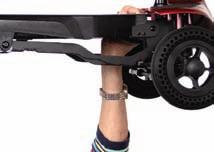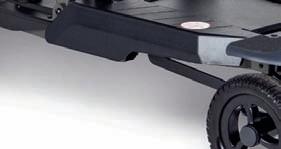


















































































































































































































































































































































































We provide a range of products to make transferring in and out of your vehicle as simple as possible
Des Gosling Mobility Ltd is the UK’s largest installer of vehicle adaptations for disabled people
A secure and comfortable handhold to help with entry and exit from your vehicle
FAST ENTRY AND EXIT STRONG DESIGN
VEHICLE SPECIFIC FITTING KITS

Easy ramp
Retro-fitted unit to transform your manual ramp into an automatic one, controlled by a wireless handset
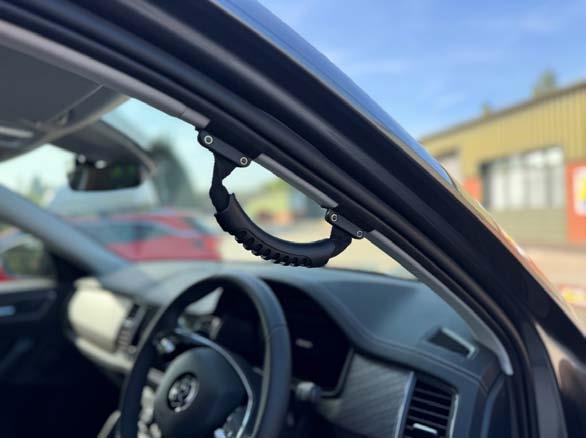
Moves seat back 100mm, increasing legroom and distance to the steering wheel
To see our full range of vehicle adaptations please visit our website.
Or give us a call to arrange a product demonstration or fitting at our showroom in Melbourne, Derbyshire or at your home address.





The S-Tran product family includes a NEW range of innovative and effective passenger transfer solutions to meet your specific needs


Another NEW product available is the Hand Held Wireless Trigger Accelerator.
Intuitive and easy to control acceleration
Power reduction switch for adapting to traffic and parking
Operable using either hand
Ergonomic and light design
Able to maintain a natural driving position
No modifications to your vehicle required


Easily transfer in and out of your vehicle

~ Programmable, backrest automatically reclines during the manoeuvre to suit your specific vehicle
~ Adaptable design makes it suitable for almost all vehicles



Seat lowers out of vehicle to reduce the distance to your chair
~ Backrest reclines up to 170° during manoeuvre, perfect for tall users or vehicles with reduced headroom
Attached using existing seat mounts so no permanent vehicle modifications

No transfer required as seat becomes a wheelchair once outside your vehicle
~ Both manual and powered wheelchair options available
~ Simple docking system designed to give you security and independence
7 Montgomerie
Terrace, Ayr, KA7 1JL
Tel 01292 287574
email: info@abilityneeds.co.uk web: www.abilityneeds.co.uk
All Rights Reserved
No part of this publication may be reproduced or used in any way without written permission of the publisher. The views expressed in this magazine are not necessarily those of the publisher and although every effort has been made to ensure that the information is accurate, the publishers take no responsibility for errors and omissions. No responsibility can be accepted by the publishers for any claims made by the advertisers in this publication.
- Featuring the latest vehicles and products available in the mobility marketplace
22 Tanni’s View


- Baroness Grey-Thompson DBE – Tanni speaks about the current Green paper on Welfar e reform and what she would like to see being changed
- It gives me the pip – Eddie discusses the failures of the government in waiting times for PIP applications and the everrising cost of the benefits bill
34 Industry Insight
- Technology – Just because we can, doesn’t mean we should –Angus discusses the technological advancements of today and if they do make life easier
44 Cheryl Everitt
- Ten days in Kansai, Japan – Cheryl tells us about her wonderful trip to Japan and her surprise at the accessibility
- Take a break and put your knowledge to the test
Purchase a digital copy of Ability Needs at www.magzter.com


Scooter Store Limited is an established company with over twentyhas become very popular especially with the elderly and disabled community nationwide.
The concept is a small, secure store designed specifically for mobility vehicles, to be operated with minimal effort. This provides the user with more independence and effective storage for their scooter at home.
The Scooter Store was designed in response to a demand from the public as many mobility scooter users have struggled to store their scooters in living rooms, communal hallways etc, causing fire hazards and limiting their space. The Scooter Store is a fireproof, theft proof, compact alternative that will enable the user to securely store their scooter.
Our product has been extremely popular with the elderly and disabled community for over twenty-five years. worked with a multitude of local Housing Trusts/Associations, charitable organisations, County, City and Borough Councils to install Scooter Stores across the UK.
All Scooter Stores are manufactured from 2mm steel with a powder coated finish, push button controlled, fully lockable and include a socket for charging the scooter is provided inside the store.
Standard, Double and Bespoke sizes are available. The stores are delivered flat packed to allow installation to awkward sites. Stores can be relocated if required.
We also offer free site surveys to give advice on store locations, hard standing areas etc, if required.

















Introducing the BattBoost, a revolutionary device designed to enhance the performance of your mobility scooter, electric wheelchair, or powerchair. This innovative accessory seamlessly connects to your vehicle without any modifications, providing an immediate boost in power and efficiency.
Equipped with advanced Lithium Power Technology, the BattBoost offers additional ampere hour (Ah) capacity, allowing your mobility device to maintain desired speeds, tackle inclines more effectively, and carry heavier loads with ease. Users can experience an average additional travel range of up to 8-10 miles, significantly extending usage time and reducing range anxiety.
One of the standout features of the BattBoost is its ability to charge your vehicle's existing batteries on the go. By maintaining optimal battery charge, it not only ensures peak performance but also prolongs the lifespan of your vehicle's batteries, resulting in economic and environmental benefits.
Designed with user convenience in mind, the

BattBoost is lightweight, portable, and includes a smart charger, quick-release attachment, and a storage bag with a carry handle. Its 'plug and play' design means no alterations to your vehicle are necessary, making it a cost-effective and user-friendly solution for enhancing your mobility experience.
Upgrade your mobility device with the BattBoost and enjoy increased power, extended range, and the freedom to go further than ever before.
Ask your Mobility Dealer for the Avon BattBoost or visit BBL Batteries www.bblbatteries.co.uk





































































































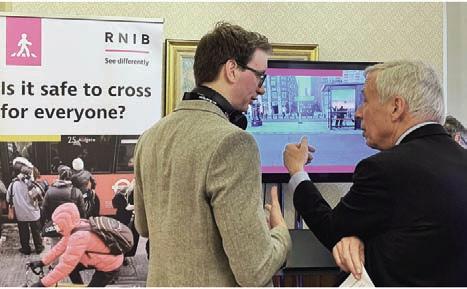
RNIB welcomed policymakers from a spectrum of political parties to gain insights from blind and partially sighted people about the challenges posed by inaccessibly designed bus stops. In particular, Peers were briefed on the serious safety risks posed to pedestrians and cyclists by “floating bus stops” – where passengers must cross a cycle lane to board and alight the bus.
To bring these dangers to life, RNIB assembled its own replica floating bus stop in the heart of Parliament. Equipped with SimSpecs replicating a range of eye conditions, headphones capturing street noise and POV video footage of a floating bus stop crossing point, this interactive exhibit allowed Peers to immerse themselves momentarily in the experience of blind and partially sighted bus users. Without exception, the lawmakers expressed their shock at the sense of vulnerability and anxiety caused



RNIB Public Affairs Officer Rhys Felton and the Rt. Hon the Earl Howe discussing the dangers of floating bus stops at parliamentary event
by this inaccessible design.
This event arrived at an important moment for the accessibility of bus travel. Through the Bus Services (No.2) Bill, the Government is seeking to enable the Secretary of State for Transport to provide guidance specifying accessibility and safety standards for the design of bus stations and stops.
RNIB has been working alongside Lord Holmes of Richmond to bring amendments to the Bill. These amendments would empower the Secretary of State to provide stronger guidance and standards that would yield more consistently accessible infrastructure. In effect, these changes would help halt the construction of inaccessible floating bus stops according to the fundamental principle that passengers must be able to access the bus directly from the pavement, without needing to cross a live cycle lane.







































Helping you with driving, accessibility and independent living
• Advice for drivers of all ages affected by restricted mobility
• Driving and passenger assessments
• Wheelchair and scooter assessments
• Driving tuition
• Retirement from driving
• Vehicle adaptations
• Provisional drivers
• Mobility equipment loading










The UK’s Wheelchair Accessible Vehicle (WAV) specialists Brotherwood celebrated 40 Years of ‘Engineering to Enable’ with a showcase of its marketleading conversions at Naidex (National Accessibility, Inclusion & Disability Expo), held at the NEC in Birmingham.
The Dorset-based conversion company was founded in 1985, and today offers a range of market-leading wheelchair passenger vehicles including the 2025 Mercedes-Benz V-Class, which was displayed on the Brotherwood stand for visitors to explore.
To mark the occasion, Brotherwood took the covers off to preview an all-new WAV which will hit the market later in 2025: the Ford Tourneo Custom, which has been engineered to feature a class-leading 63″ / 1600mm of internal headroom – the highest capacity of any accessible vehicle in its class. Along with a restraint system capable of restraining wheelchairs up to 200kg, Brotherwood’s conversion for the Tourneo Custom is positioned to become the go-to choice for users of larger and heavier powerchairs, looking for a vehicle to enable them to travel in comfort, inclusion and safety.
Brotherwood Managing Director John Daniel commented: “We are delighted to have been a part of Naidex 2025, and appreciate the opportunity to meet with so many members of the disability community to discuss their needs.
Our new conversion for the Ford Tourneo Custom has been warmly received by all who experienced it, and marks a new chapter in the Brotherwood story, in partnership with Ford as a Ford Pro Convertor.
Our 2025 Mercedes-Benz V-Class ‘Exclusive’ also attracted plenty of interest, combining exceptional functionality with market-leading comfort and luxury – it
really is the Ultimate Wheelchair Accessible Vehicle.
We thank all who came to see us to celebrate the milestone of our 40th anniversary, and thank Naidex, for putting on an incredible event.”
All information including dimensions and technical data subject to testing in accordance with PAS 20121:2019 and GB Whole Vehicle Type Approval.
Brotherwood are the UK’s Wheelchair Accessible Vehicle (WAV) Specialists and are recognised as the market leader in Wheelchair Accessible Vehicle Design. We believe that every WAV should prioritise comfort, inclusion, and safety for the wheelchair user.
Offering a range of new Wheelchair Accessible Vehicles for sale, as well as factory refurbished WAVs; Brotherwood also offer flexible, long or short-term accessible vehicle hire.
Brotherwood offer free, no-obligation home demonstrations across the UK, and work in conjunction with Case Managers and Occupational Therapists to deliver mobility solutions for wheelchair users.
Brotherwood are also a certified CPD Member, offering free training sessions, study days and workshops to healthcare professionals involved in the provision of accessible transport; ensuring that Case Managers are equipped with the knowledge to enable them to perform transport needs assessments, and ensuring their client’s needs are accurately measured and met.
Brotherwood are also members of WAVCA (The Wheelchair Accessible Vehicle Convertors Association) and are approved suppliers to the Motability scheme.




Friday 9th - Saturday 10th May 2025, 10am - 4pm at Haynes Motor Museum just off the A303 at Sparkford, Somerset, BA22 7LH
»

Work will be unlocked for thousands of sick and disabled people through new measures that will bolster the support offered in Jobcentres and make the welfare system more sustainable, the Department for Work and Pensions has announced
The plans will see 1,000 existing Work Coaches deployed in 2025/26 to deliver intensive voluntary support to around 65,000 sick and disabled peoplehelping them to break down barriers to opportunity, drive growth and unlock the benefits of work
This intensive support for people on healthrelated benefits – including those furthest away from work – will see Work Coaches providing tailored and personalised employment support, and help claimants access other support such as writing CVs and interview techniques They will also access a range of DWP employment programmes to help claimants unlock work based on conversations with their Work Coaches
The additional help will be delivered by reprioritising work coach time so they can focus on tackling economic inactivity in order to make the welfare system more sustainable. The 1,000 redeployed Work Coaches are a “downpayment” on wide-ranging plans to overhaul employment support, which are set to be unveiled in just a few weeks’ time
It is part of the Government’s Plan for Changewhich will boost living standards and grow the economy by unlocking work for the 2 8 million people who are economically inactive due to longterm sickness – the highest in the G7 - and bring down spending on incapacity benefits which is expected to reach £70 billion by the end of this parliament
It comes as new survey results show the current
system isn’t just failing the taxpayer, it’s also failing the people it’s meant to help, with 44% of disabled people and people with a health condition believing DWP does not provide enough support to people who are out of work due to disability, ill health, or a long-term health condition.
Work and Pensions Secretary, Rt Hon Liz Kendall MP said: “We inherited a broken welfare system that is failing sick and disabled people, is bad for the taxpayer, and holding the economy back For too long, sick and disabled people have been told they can’t work, denied support, and locked out of jobs, with all the benefits that good work brings
“But many sick and disabled people want and can work, with the right support And we know that good work is good for people – for their living standards, for their mental and physical health, and for their ability to live independently
“We’re determined to fix the broken benefits system as part of our Plan for Change by reforming the welfare system and delivering proper support to help people get into work and get on at work, so we can get Britain working and deliver our ambition of an 80% employment rate ”
The data from the DWP Perceptions Survey –soon to be published in full - also shows:
• 35% of disabled people and people with a health condition believe DWP does not provide enough support to people of working age who are out of work, to help them get back into work
• 44% of disabled people and people with a health condition don’t trust the DWP to help people reach their full career potential
You can be too.
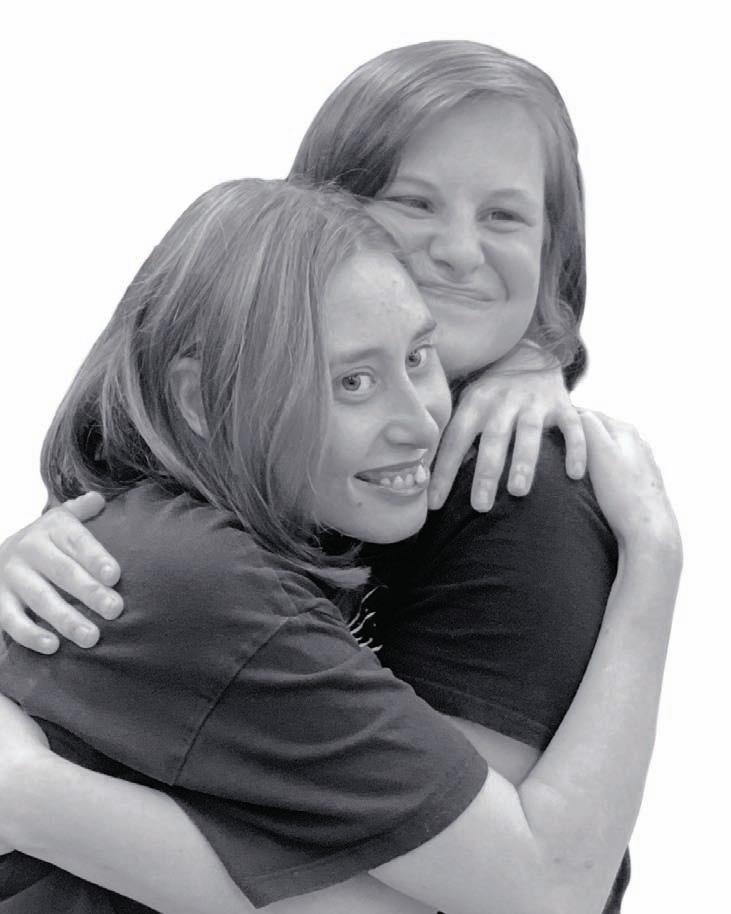

Portland College is a happy and safe place where you will make lots of friends and really fit in. Our Outstanding day and residential education programmes are tailored to meet your individual needs and help you achieve your goals, your way.
Our Residential Learning Service provides tailored, high-quality support that connects Ofsted Outstanding education with residential life.
Opening in September 2025, The Pines Accommodation will provide 9 en-suite bedrooms and shared social space, in addition to 6 self-contained apartments, expanding our Independent Living programme.

Portland College Nottingham Road, Mansfield, Nottinghamshire, NG18 4TJ
T: Main College Reception 01623 499111
T: Admissions 01623 499114 / 499186
E: admissions@portland.ac.uk www.portland.ac.uk



To find out more or to book on onto our next virtual open day, visit www.portland.ac.uk or call 01623 499111
• Nearly 2 in 5 (39%) disabled people and people with a health condition do not trust DWP to take its customers’ needs into account in how it provides services
These figures follow recently released data which shows that there are over three million people on Universal Credit with no obligation to engage in work-related activity, despite over a quarter (27%) of health and disability benefit claimants believing that work could be possible in the future if their health improves and 200,000 saying they would be ready to work now.
Data also shows the number of working-age people on Universal Credit with no work-related requirements has risen to 3 1 million, reflecting the alarming rate at which young and working aged people are increasingly falling out of work and claiming incapacity benefits
Behind each of these statistics is a person with hopes and ambitions, who can provide businesses with much-needed skills and experience, helping to grow our economy.
To give people the support they deserve, and restore trust and fairness to our welfare system, reforms to the welfare system are expected to be announced in just a few weeks
These reforms will recognise that some people will be unable to work at points in their life and ensure they are provided with support while transforming the broken benefits system that:
• Asks people to demonstrate their incapacity to work to access higher benefits, which also then means they fear taking steps to get into work
• Is built around a fixed “can versus can’t work”
divide that does not reflect the variety of jobs, the reality of fluctuating health conditions, or the potential for people to expand what they can do, with the right support
• Directs disabled people or those with a worklimiting health condition to a queue for an assessment, followed by no contact, no expectations, and no support if the state labels them as “unable” to work
• Fails to intervene early to prevent people falling out of work and misses opportunities to support a return to work
• Pushes people towards economic inactivity due to the stark and binary divide between benefits rates and conditionality rules for jobseekers compared to those left behind on the health element of Universal Credit
• Has become defined by poor experiences and low trust among many people who use it, particularly on the assessment process
The government’s plans to fix the broken benefit system will build on the biggest employment reforms in a generation announced in the Get Britain Working White Paper, which will empower mayors to drive down economic inactivity, deliver a Youth Guarantee so every young person is either earning or learning, and overhaul jobcentres across the country
Former John Lewis boss Sir Charlie Mayfield is leading an independent review investigating how government and employers can work together to help disabled people and those with ill health who may be at risk of falling out of work stay on in employment, with the findings of the discovery phase expected in the spring
The government is also investing an additional £26 billion to cut NHS waiting lists and get Britain back to health and back to work The government has already delivered on its pledge, providing two million extra appointments in five months and as a result, around 160,000 fewer patients on waiting lists today than in July.

Teams of clinicians will also introduce new ways of working at 20 hospital sites in areas with the highest levels of economic inactivity to help patients return to the workforce faster This is alongside the recruitment of an additional 8,500 mental health workers to ensure mental health is given the same attention as physical health
Specialist further education college Derwen College was recently honoured to welcome His Royal Highness The Duke of Edinburgh,to their main campus in Gobowen. His Royal Highness was given a tour of the College’s unique ‘Marketplace’ and Duke of Edinburgh’s Award Outdoor Centre, meeting students and staff along the way.
His Royal Highness watched as students, with a wide range of special educational needs and disabilities (SEND), working towards their Bronze, Silver, and Gold Duke of Edinburgh’s Awards, demonstrated activities. These included boarding the canoe simulator,
scaling the traversing wall, and outdoor cooking around the firepit.
The Duke then visited the College’s remarkable Marketplace, where he met students and staff working in the College’s Garden Centre and Gift Shop and The Vintage Advantage charity shop. Students were delighted to have The Duke take part in work-based activities with them.
Retail student Jonathan demonstrated his work skills in the Garden Centre and Gift Shop by creating a hamper with The Duke, containing Derwen College-made jams and chutney.
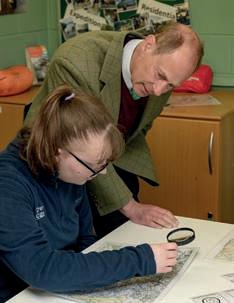



Jonathan said: “His Royal Highness asked me about me work in Retail and helped to

make a hamper with me using a planogram. He put us all at ease. It was a really proud moment for me and for the College.”
Lizzie, who is taking her Duke of Edinburgh Gold Award, showed The Duke the outdoor centre climbing wall. She said: “I was so nervous but he was lovely. He even had a go on the traversing wall and was really good at it.”
The royal visit was a momentous occasion for Derwen College, celebrating the achievements of its students and clients, and reinforcing the importance of opportunities for young adults with SEND.











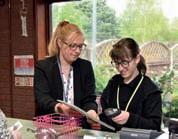





Derwen College is a specialist day and residential college for young adults (aged 16–25) with special educational needs and disabilities (SEND). Through a variety of taught and practical activities, students learn: Our pathways and programmes are tailored to meet individual student needs in preparation for adulthood




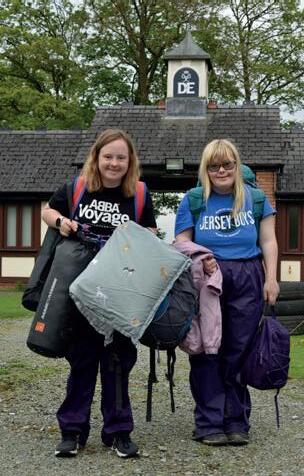

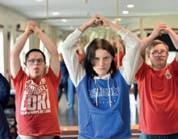














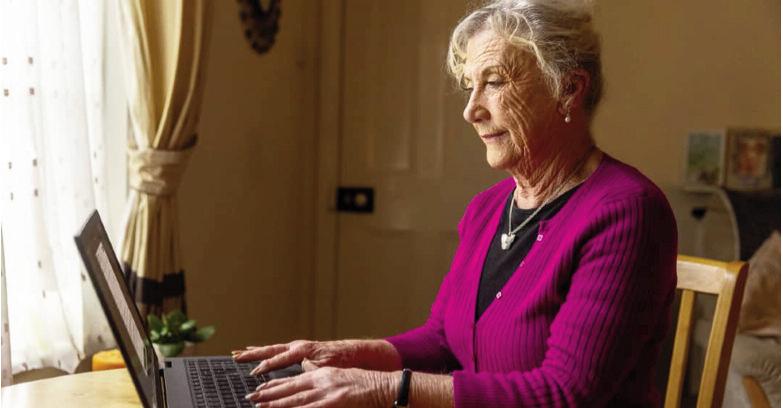
A new report from RNID has exposed a serious lack of progress on the availability of ear wax services in England, leaving 8 1 million with zero support and at risk of preventable hearing loss The research has revealed a postcode lottery across England, as almost half of Integrated Care Boards (ICBs) – the commissioners of most NHS services – are still not providing wax removal services in line with public health guidelines
In areas with zero service, people with ear wax buildup have no choice but to pay for private removal, which can cost up to £100 per session With 1 in 10 people requiring ear wax removal three or more times per year, this can become prohibitively expensive
An estimated 2 3 million people in the UK require professional ear wax removal every year Older people, hearing aid users and people with learning disabilities are more likely to be at risk. Our research has revealed the painful and distressing symptoms faced by people unable to access the necessary wax removal services Nearly half experienced hearing loss, a third experienced earache, and a quarter developed tinnitus Additionally, one in five reported poor mental health and feelings of isolation, whilst 1 in 10 had to take time off work as a result
For many years, wax removal was available at GP surgeries, but our research shows that half of people with ear wax build-up have been forced to pay for ear wax removal services, with the majority doing so because of a lack of NHS services locally
Without access to ear wax services, many people are also left to attempt ear wax removal at home
Our survey has revealed the extent to which dangerous DIY self-management methods such as cotton buds and tweezers are used, despite the fact these methods are known to cause infection, ear canal or ear drum damage and permanent hearing loss
Our Stop the Block campaign is calling on the
Government to urgently step-in to ensure everyone who needs wax removal can access it on the NHS. We’re calling on the Department of Health and Social care to:
• Work with ICBs and ensure that everyone with a medical need for wax removal has free access to it, in-line with NICE (National Institute of Clinical Excellence) guidance.
• Publish improved patient information on the selfmanagement of ear wax, so people can manage their wax safely from home, and ensure that GP surgeries share consistent, safe and evidencebased information with their patients.
Audrey Houghton, 70, from Biggleswade has had recurring ear wax build-up which affects her hearing since she started using hearing aids around 20 years ago.
Regular treatment at her local GP surgery helped manage the issue, but three years ago she was told the service was no longer available and to go privately However, a bad experience with a private ear wax removal service made Audrey reluctant to go back for more treatment The impact on her life was significant
Crystal Rolfe, Audiologist and RNID Director of Strategy, said: “It is unacceptable that millions of people across England are still unable to access vital ear wax removal services from the NHS in their local area. Thousands are being forced to endure painful and debilitating symptoms or resorting to costly private treatment – options that many simply cannot afford
“We urge the Department of Health and Social Care to commission an urgent review to ensure that everyone who needs ear wax removal has access to local NHS services when they need them.”
For more information contact RNID by telephone on 0808 808 0123 or visit www.rnid.org.uk






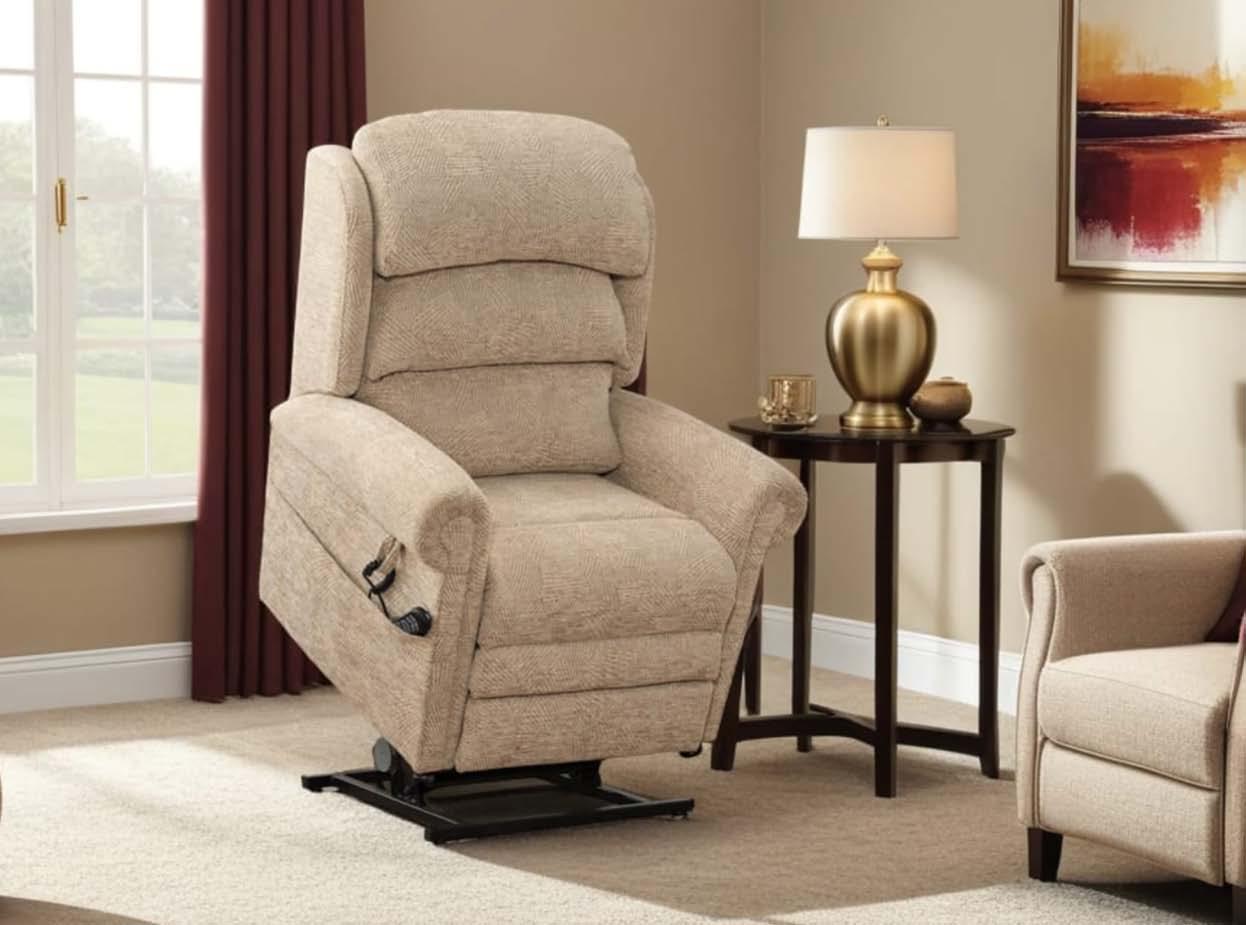
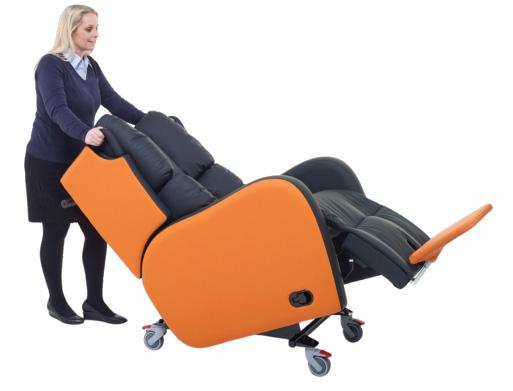

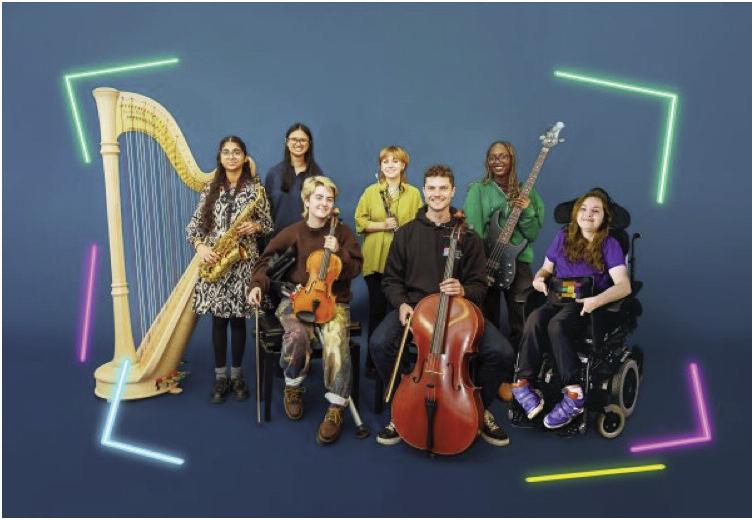
The world’s first disabled-led national youth ensemble, the National Open Youth Orchestra (NOYO), returns to London with an uplifting programme of music for 2025 before continuing their tour in Poole, Cardiff and Birmingham. In a relaxed performance at Milton Court Concert Hall, the orchestra welcomes a diverse audience – inclusive of disabled and neurodivergent concertgoers and families – for a joyous afternoon of music, in partnership with Guildhall School of Music & Drama
Following the triumph of Feel The Music at Milton Court Concert Hall last year, 16 musicians come together for a 2025 concert tour, Ring Out! No more barriers, just great music, featuring relaxed and British Sign Language-interpreted performances across the UK
This pioneering ensemble, which brings together disabled and non-disabled musicians aged 11-25, presents an exciting new programme of contemporary classical music including two world premieres
The tour visits four UK cities, with the ensemble appearing in Cardiff for the first time:
• Sunday 27 April 2025, 3-4pm - Milton Court Concert Hall, London
• Saturday 10 May 2025, 3-4pm- Lighthouse Poole (live and streaming)
• Saturday 17 May 2025, 3-4pm - Hoddinott Hall, Cardiff (debut performance)
• Sunday 8 June 2025, 3-4pm - Birmingham Town Hall NOYO launched in September 2018, to provide a progression route for some of the most talented young disabled musicians in the UK A pioneering inclusive ensemble, NOYO promotes musical excellence, supporting 11–25-year-old disabled and non-disabled musicians to rehearse and perform together Some of the NOYO musicians play acoustic instruments; others, play accessible electronic instruments NOYO collaborates with cutting-edge composers to create new and exciting music for a diverse range of musicians and instruments
NOYO continues its commitment to new music with the programme for its third series of relaxed concerts, showcasing the orchestra’s genre-bending creativity with two new commissions NOYO pianist Oscar Abbott performs the world premiere of Ivors Academy Awardwinning composer Liam Taylor-West’s piano concerto Ring Out!, commissioned by Dr. John Manley (High Sheriff 2020-21) The piece was due to be performed at the 2020 High Sheriff ’s Concert at Bristol Cathedral, which was cancelled due to the COVID-19 pandemic NOYO’s young members’ voices continue to be central to the programme, which includes the world premiere of Yfat Soul Zisso’s Fragile Commissioned in partnership with nonclassical, this 10-minute composition focusses on climate change, a theme close to their hearts
The programme also features bold new arrangements of familiar works, including an energetic rendition of Meredith Monk’s minimalist Parlour Games, and a joyful arrangement of the jazz funk tones of Lucky Chops’ Behroozi Barriers, written by former NOYO member Oliver Cross and performed by the orchestra in 2022, is a heartfelt tribute to lost friends and fellow disabled musicians. The orchestra also gives new life to Kate Whitley’s Falling, originally composed as part of a collaboration that brought together professional disabled and non-disabled musicians from RNS Moves and BSO Resound
All pieces in the programme have been composed or re-arranged specifically to showcase NOYO’s instrumentation, which combines traditional acoustic instruments with electronic instruments rarely found in orchestras, such as the bass guitar, or cutting-edge electronic instruments, such as the Clarion®, which can be played with any movement of the body The Clarion is an accessible digital instrument played on an iPad by NOYO musician Evie Read It is also the first-ever digital instrument to be recognised by the Associated Board of the Royal Schools of Music (ABRSM)
Tickets for the National Open Youth Orchestra concert at Milton Court Concert Hall, London, on 27 April are on sale now at www.gsmd.ac.uk/whats-on
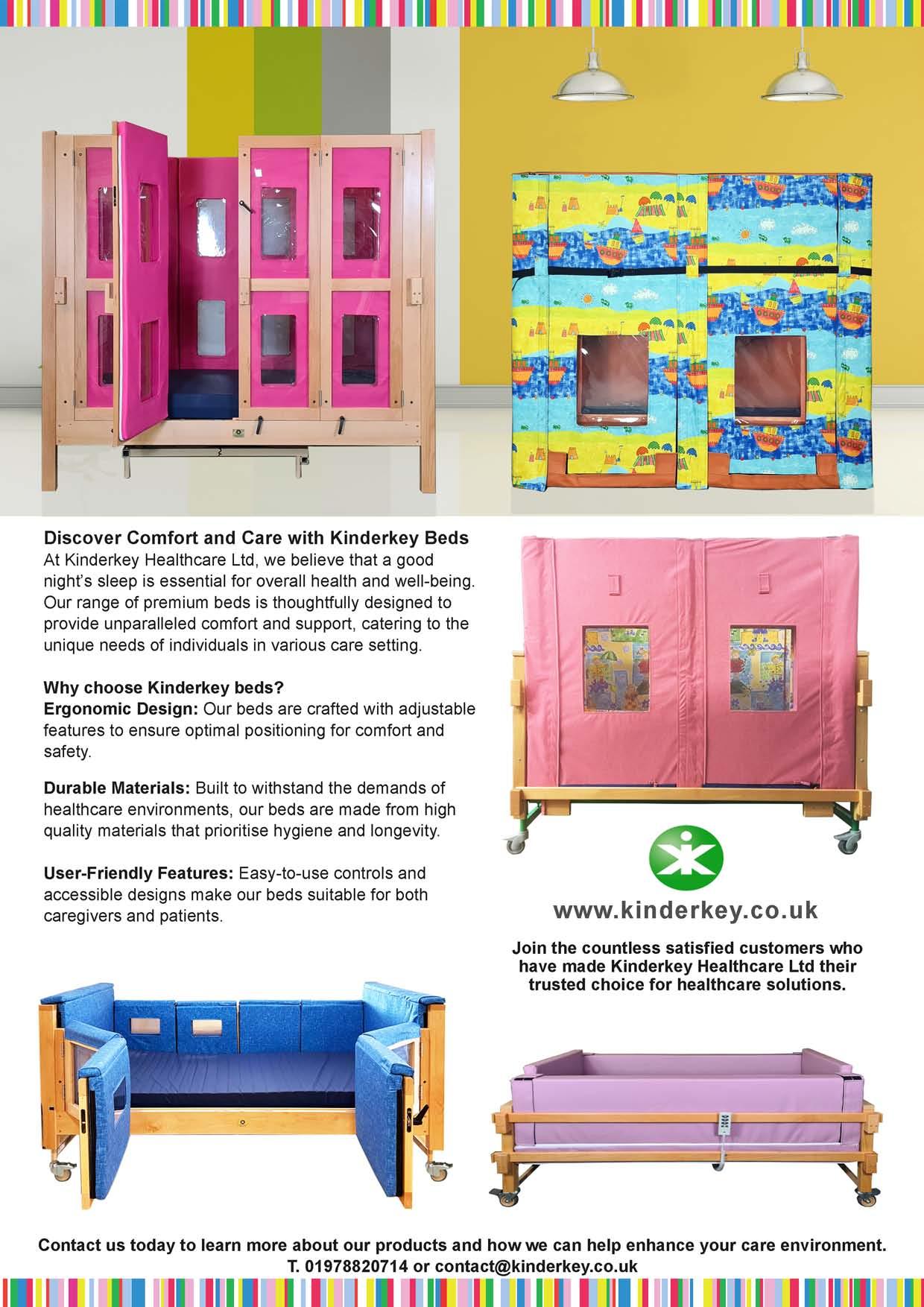

The last time that the British Parliament substantially looked at ‘Welfare’ was back in 2012 and there is a certain irony that at the same time many were (quite rightly) lauding the performances of amazing British talent at the Paralympics, the then coalition Government were looking at ways to reform the system. The language that we were hearing then is very similar to what we are hearing now and some of it is hard to dispute. We are told that we need to get support to the people who need it most. There is not much to disagree with there. But, as always, it is what happens to those whose support is removed. Since 2012 there have been shifting sands. The benefits system is open to more and Personal Independence Payment (PIP) has expanded. According to the Government 1 in 10 people are on some form of benefits.
The Green paper, which is a consultation document, has been released and they are rarely quick or simple to read. Generally, you have to read them a few times to see what is being proposed and it is possible to read them several different ways. This time there were no quick responses from any charity briefing about what the proposals might mean, although when I got to read the Green paper some of the enquiries I had received started to make sense. I didn’t do any interviews until I had been
able to read it, but there were several journalists asking about PIP and inferring it was an out of work benefit. I explained many times that it was not. On reading the paper it became clear to me that closing the work capability assessment, and seemingly wrapping it into PIP, it is possible to understand where that view was coming from. I support disabled people being able to get in to work, they should be, but it has to be decent work, and we know that many disabled people are in low paid work, which comes with an additional set of barriers.
What we don’t need is another set of schemes. There has been lots of tweaking with previous ones, but it has to be something more than an employer sticking a badge on a website. The job coaches might help some, but employers need commit to doing more. It still feels like there are employers who think that it is too hard. So many disabled people write and tell me they have been for so many interviews but don’t ever get a job. I firmly believe that employers should have to measure the disability pay gap. It feels that they don’t do it because they know that it is not going to be great. I suspect that this is the same reason that the Government didn’t release the impact assessment at the same time as the Green paper.
We are a long way from seeing changes. This is the consultation. I imagine that there will be a tonne of responses that they will have to sift through. The
Bill then has to be written, and it has to get through both chambers in Parliament. While there were some who thought that with Labour in power that any previous discussions about reform might go away. The reality is that any Government would have had to look at it.
Welfare reform is not simple. The benefits system is even harder to understand and having to explain that PIP is designed to help disabled people with the extra costs of being disabled seems to get lost. There have previously been suggestions of means testing it but, like winter fuel payments, it would probably cost more than it would save. There seems to be some sort of misunderstanding that the world is more accessible than it is. In the same week that I did many interviews on the Transport Select Committee report that said public transport for disabled people was a ‘national embarrassment’, I had three failures on the railway network. Although I had booked each journey it didn’t seem that information got through to those who needed to know it.
I lost a philosophical debate last time about how we might be able to do things differently. I would be interested in a system where, instead of people having to prove what they can’t do in order to gain support, to looking at what people can contribute, and it would help change the negative tones we are hearing.

Crelling Harnesses manufacture a full range of special needs harnesses suitable for use on all kinds of equipment including wheelchairs, buggies, scooters, shower chairs, bathing equipment, stair lifts and seats in cars, buses and aircraft etc. The vehicle harnesses are designed to be worn in conjunction with the existing safety belts to provide additional postural support and/or to offer a certain degree of restraint when used for those passengers with behavioural problems or learning difficulties.

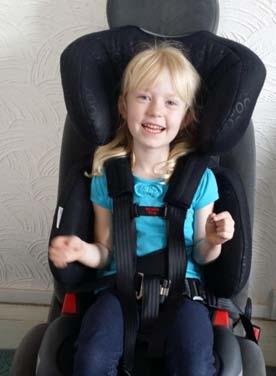

If you, a relative, or friend struggles with everyday tasks, there is help available in the form of Assistive Technology. Assistive Technology is terminology used to describe useful gadgets that can aid independent living and Medpage Limited has been at the forefront of their introduction for over 40 years.
Our product portfolio focuses on personal safety and carer support in the home and community. Our devices to detect epileptic seizure movement have inspired a generation of product research and development since their introduction in 1996. We produce a range of fall detection and prevention products that are an integral part of NHS and Local Authority falls management strategies for seniors and falls risk patients. The same affordable technology is used widely by countless families to safeguard the ones they love.

Medpage Limited has collaborated with a leading UK manufacturer of crash mats to deliver a cost-effective tool for falls management strategies. The inclusion of the new TumbleCare full-length pressure mat sensor ensures that should a patient tumble out of bed, an alarm signal is generated to alert care staff to the incident. Beneficial for individuals who are at high risk of falling, such as older adults, patients recovering from surgery, or those with neurological conditions such as epilepsy.
Medpage, in collaboration with Atlinks, has developed a fall sensor bracelet that triggers automatic SOS emergency contact dialling using the Amplicomms BigTel 50 PLus. The Big Tel 50 is a big button landline telephone designed for simplistic use with extra loud earpiece, and ringer volume to benefit the hard of hearing. The waterproof fall sensor is of benefit to seniors, people with medical conditions, brain injury, diabetes, impaired balance and epilepsy.






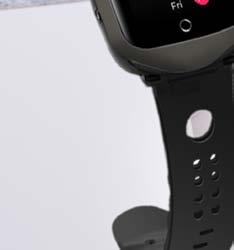












TRIRIDE ARE A market leader in the production of Power Add-on devices. Whether you want full electrical assistance, or a Hybrid assisted handcycle we have you covered. Simply attach to your manual wheelchair in seconds and discover a new Freedom.

The Triride Special Compact HT with all road tyre is a great all-rounder providing full electronic assistance. Small, compact, packed with plenty of

power to tackle those steeper inclines and handle some off-road use, but small enough and light enough to transport in the boot of your car. Triride technology compliments the drive performance with Intelligent Cruise Control and
Intelligent Braking System makes driving with family and friends a breeze. Paired with Triride’s patented attachment method, fitting to most manual wheelchair is possible and customisable to each individual user requirements.
Wanting to go off the beaten track further? Combine any one of our Triride or Tribike models with the ground breaking MTW Trekking system. The Trekking Power system is an easily attachable rear axle system that provides you with three wheel drive power and ultimate traction to tackle almost any terrain, truly know no limits with Triride and the Trekking Power system. With it’s multi use you know have 3 systems in one, indoor with joystick, Triride only for the city and MTW power for your trekking desires.













It’s revealed only one in five UK adults know MS is most likely to be diagnosed in people in their 30s and 40s Despite this, almost three quarters (75%) of people in that age group, who were aware of MS, didn't know:
• there’s a usual age for MS diagnosis
• what that age is
The survey also found:
• Almost nine in ten people have heard of MS (89%)
• Of those who’ve heard of it, 82% know it’s a lifelong condition, 78% know it affects nerves in the brain and spine, and most are also aware it’s unpredictable (75%)
• But only a third know women are more likely to be diagnosed with MS than men (36%)
• And less than a third (30%) know that smoking, obesity and lack of sunlight can increase a person’s risk of developing MS
A few people in the public eye are living with MS, including British Paralympian and our Ambassador Kadeena Cox OBE, who was diagnosed with MS aged 23. And actors Selma Blair and Christina Applegate, who were both in their 40s when they found out they had MS.
Nin Sambhi is 40 and from Staffordshire: “I was diagnosed at 37 Before that I had things like eye shudders and itchy skin, looking back they may all have been sensation and nerve related Nothing was investigated until I had a massive relapse, I went into hospital on a Monday and was diagnosed on Friday
“I’d never heard of MS, I was gutted, absolutely gutted I couldn’t walk, couldn’t do anything The fear

Jess O’Hare is 43 and from Liverpool: “It took me years to get a diagnosis. Originally, I kept going to the doctors because of fatigue, I just did not feel normal It was only when I went completely numb that I got sent to neurology I got the actual results in 2019 I’d never heard of MS before, I didn’t have a clue what it was "
“I did kind of think it was an old person’s thing. I worried that if I feel like this now, how am I going to feel in 20 or 30 years. Family and friends just responded with shock more than anything, people didn’t know what it was ”

Our Executive Director of Research and External Affairs is Sarah Rawlings: “It’s great so many people in the UK have heard of multiple sclerosis But these new findings show we have lots of work to do to increase understanding around the condition affecting younger people
“MS can be debilitating, exhausting and unpredictable and we know it often strikes at a time when people are making big life choices about careers, relationships and family If there’s greater understanding of MS – that could make a huge difference, from taking the fear away from a diagnosis, to making conversations with family, friends and employers that little bit easier ”
Our MS Helpline is here for everyone affected by MS We’re here Monday to Friday, 9am to 7pm except bank holidays and public holidays It’s free to call from landlines and mobiles within the UK What you tell us is confidential and when you call us, it won’t show on your phone bill
Tailored for Your Comfort. Designed for Your Life.
No two people are the same—your needs, your comfort, and your home are all unique. That’s why the New ergo Ultimate is more than just a stairlift — it’s a premium mobility solution, designed around you.











Upholstery options A S ta irliftBuilt A r o und You
Contact us to know more about the New ergo Ultimate:
1535 63 11 77 enquiries@platinumstairlifts.com










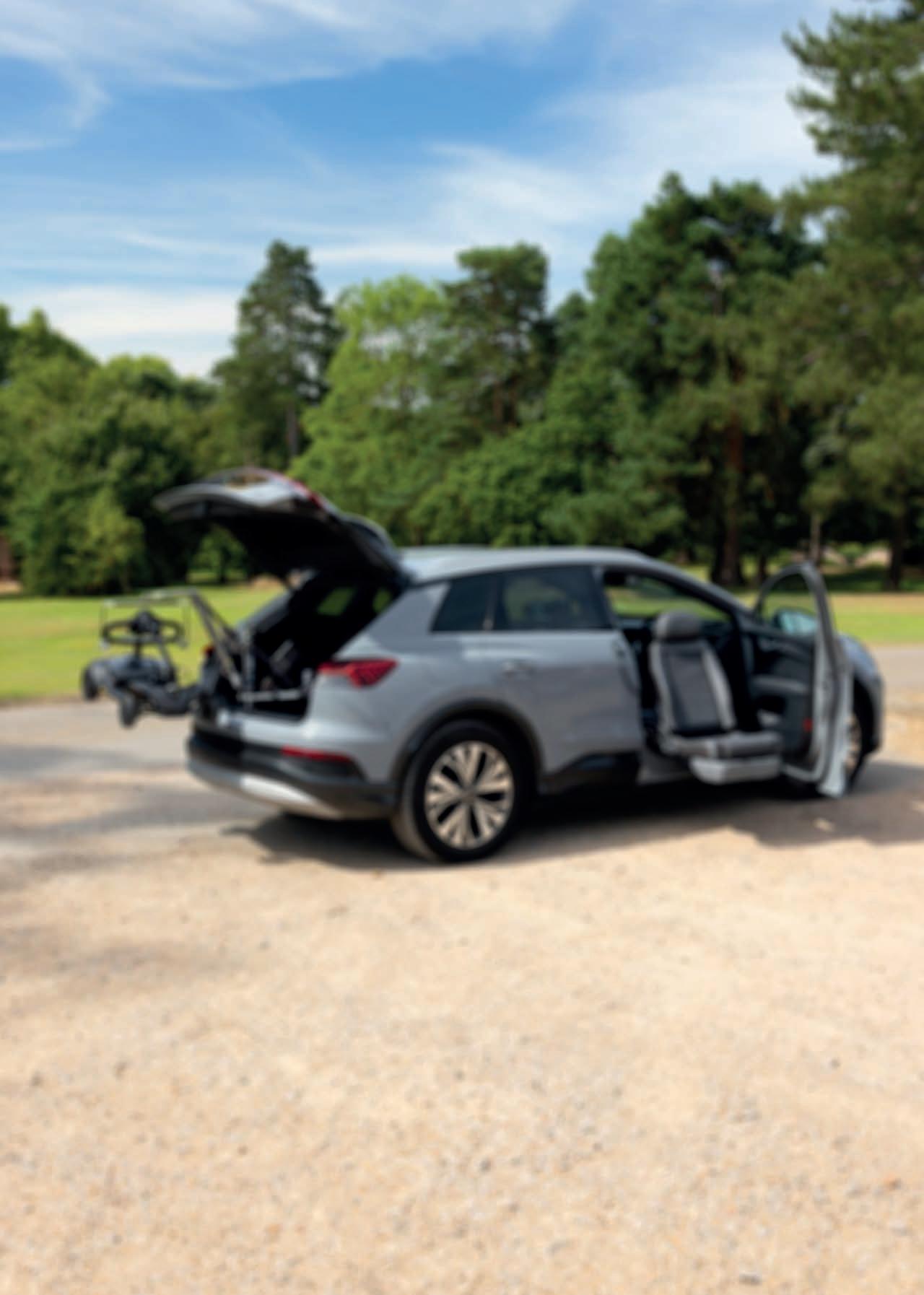

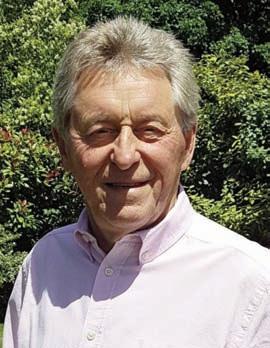
It gives me the pip.
features, most of which are entirely pointless.
Although the older adages seem to be heard less and less, I find myself muttering them to myself more and more these days.
+,!'-&)./&!&$0&,1!2&.!&)!&.&'#!3%!14(3!&),!%55&1(%)6!7!2#&-.!32#/!-#'4$&-$,*!!"#$%&' ()&'*++',#)-'.//0'1$'#$.'2*03.&4'!5&%0'*'(1/'1$'*'(#3.6!&).*!02#)!/,!'-&).&.!8%-'%3!3%!
My grandma always had an adage to suit any occasion. I heard them regularly, “Don’t put all your eggs in one basket, “It’s a pig in a poke” and, when my grandad forgot to take his muddy boots off, “It gives me the pip”.
3&9#!2(1!/4..,!:%%31!%88*!!5&'/17.0'8.'&9.'(1(6 ;2&3!14-<-(1#.!/#!32#)!0&1!32#!84).&/#)3&$!3-432!:#2().!32#/!&$$6!=2-#0.!&.>(5#!32&3! 2&.!:##)!%:1#->#.!&!32%41&).!3(/#1!:#8%-#6!+&),!%8!32#/!2&>#!1$(<<#.!()3%!2(13%-,!&).! 32#-#!&-#*!()#>(3&:$,*!<$#)3,!%8!)#0!&<2%-(1/16!7!&/!<&-3(54$&-$,!9##)!%)!?:5;;'<':..('5&' @6!7!2&>#!8%4).!32(1!3%!:#!.,)&/(5!&).!#88#53(>#!()!/&),!8&5#31!%8!$(8#6!A2(1! (1!<%11(:$,!:#5&41#!7!&/!&!1(/<$#*!13-&('23!8%-0&-.!52&<!:43!/%13$,!:#5&41#!7!2&>#!1##)! )4/#-%41!3(/#1!02#)!1(/<$(5(3,!0&1!&!>#-,!#88#53(>#!3%%$6!! "%0!/&),!%8!41!&-#!<#-<$#B#.!:,!32#!4))#5#11&-,!5%/<$#B(3,!%8!/&),!%8!32#!$&:%4-C 1&>()'!.#>(5#1!0#!41#!32&3!&-#!()3#).#.!3%!/&9#!$(8#!#&1,D!A&9#!&!$%%9!&3!,%4-!AE! -#/%3#!5%)3-%$6!A2#-#!&-#!:433%)1!%)!32#-#!32&3!/&9#!)%!1#)1#!&3!&$$6!78!,%4!&-#!()!&),! 0&,!?3#52!1&>>,@!32#!0%-$.!%8!5%/<43#-1!0($$!<-%>(.#!#).$#11!0&,1!3%!0&13#!2%4-1! 02($#!,%4!?%<#)!32#!8($#!.#5#(>#-!()!%-.#-!3%!1488%5&3#!,%4-!5&52#F6@!G1!8%-!5&-1H!I4-! %):%&-.!?()8%3&()/#)3!8&5($(3,@!2&1!&!/,-(&.!%8!8#&34-#1*!/%13!%8!02(52!&-#!#)3(-#$,!

What surprised me then was the fundamental truth behind them all. Shrewd advice that had been observed a thousand times before. Many of them have slipped into history and there are, inevitably, plenty of new aphorisms. I am particularly keen on “ K I SS –K e e p I t Si m p l e St u p i d” . I have found this to be dynamic and effective in many facets of life. This is possibly because I am a simple, straight forward chap but mostly because I have seen numerous times when simplicity was a very effective tool.
How many of us are perplexed by the unnecessary complexity of many of the labour-saving devices we use that are intended to make life easy? Take a look at your TV remote control. There are buttons on there that make no sense at all. If you are in any way “tech savvy” the world of computers will provide endless ways to waste hours while you “open the file deceiver in order to suffocate your cache….” As for cars! Our onboard “infotainment facility” has a myriad of
Take, for example, “ t h e r e i s n o t h i n g n e w u n de r t h e s u n ” . Just about a dozen years ago, 2013 to be precise, the government introduced a fresh process to help disabled people access much needed funds to fulfil their daily living needs. One intention for this change was to speed up the processes from the previous DLA scheme. Initially this was a positive move and did indeed improve the overall situation. This is now, unfortunately it seems, a very different story. Take a deep breath and hang on to your hat before you read this next paragraph.
Last year, in May 2024, there were 392,000 outstanding PIP award reviews and at the end of 2024 the “median wait for a review initiated by the DWP was 290 days”. (Stephen Timms, Minister of State for Social Security and Disability)
That is over 8 months! There are reports of people waiting over a year. The claim form itself is a challenge, asking 50 pages of questions. Whilst we are all reassured that the application process is thorough, surely it cannot be so challenging that we can’t manage to attend to these applications more promptly? The backlog is reported to be the result of a shortage of assessors and an increase in claims, and who knows how many cases are in the queue now. Without wishing to appear flippant, it seems that the government “ c
I see and hear our current Health Minister, Mr. Streeting, in the media regularly and I am impressed by his demeanor and good intentions.
I certainly do not envy him as he sets about reorganising our NHS and social care system. This is not a column to espouse political views and the challenges inside our national infrastructure are the result of decades of mismanagement from governments of every colour. The UK’s overall benefits bill has increased from £13 billion to £48 billion since 2019. The cost of working age sickness and disability benefits is projected to reach £70 billion in the next 5 years. This is indeed a serious situation, and we
G$32%4'2!32#!%$.#-!&.&'#1!1##/!3%!:#!2#&-.!$#11!&).!$#11*!7!8().!/,1#$8!/433#-()'!32#/! 3%!/,1#$8!/%-#!&).!/%-#!32#1#!.&,16!!
A&9#*!8%-!#B&/<$#*!#&9.-.'10'$#&91$/'$.>')$=.-'&9.'0)$$!"J413!&:%43!&!.%K#)!,#&-1!&'%*!
An increasing number of people looking after a disabled, older or ill relative are experiencing poor mental health because they cannot take a break from caring. More than half (57%) of people responding to the latest State of Caring Survey by Carers UK say they feel overwhelmed ‘often’ or ‘always’. Over a third (35%) say they have ‘bad’ or ‘very bad’ mental health, compared to 27% in the previous year’s survey.
A significant number (65%) of unpaid carers told the charity that the reason they feel overwhelmed is because they are not able to take time away from their caring roles, with two thirds (66%) saying they need more support with their health and wellbeing.
Under the Care Act 2014, carers are entitled to have a Carer’s Assessment by their local council, offering an opportunity to discuss the help they need in their caring role and assess whether they are eligible for additional support. However, Carers UK found that most carers
providing substantial care are not receiving Carer’s Assessments. Only 23% have completed an assessment in the last 12 months and 42% of these say their local authority has not supported them following this. 47% say that the assessment identified areas where they need more support, but this has not yet been provided.
Challenges with social care services are also impacting on peoples’ ability to take a break. 57% of carers experience long wait times for support and 51% say that services were not available when they need them. Of those experiencing difficulties, 79% say it has negatively impacted their mental health.
Unpaid carers, who provide care worth a staggering £184 billion to the economy every year, are more likely to develop long-term physical or mental health conditions, disabilities or illnesses compared to those without caring roles.
For practical advice and information about caring, go to www.carersuk.org, email advice@carersuk.org or call our helpline 0808 808 777

This was the first joint event in the UK between the companies. The number of visitors to the stand was amazing said Friedrich Schrittwieser, Head of Sales for Hoss Mobility. The team from AddMobility were impressed that many visitors to the stand came with last quarters Ability Needs Magazine, showing our advert on the back cover and saying that they wanted to try the Hoss.
The stand itself was designed to allow users the chance to see the benefits of the Hoss with its ability to start easily on a slope and the safety features built in.
The team at Hoss Mobility and AddMobility are now planning their attendance on the Innovation stand at Motability Live at the NEC on 16 and 17 May. Even though the Hoss R1 is not available on Motability, potential users will get another chance to test the exciting product with other innovative products in the market.
c o n f i d e n c e t o
o l d e r a n d
d i s a b l e d p e o p l e
u s i n g t h e r a i l
n e t w o r k
A
E n g l a n d

In April, the train operator Northern will test a new scheme that enables people on its services between Preston and Colne to alert the conductor of their assistance requirements up until just ten minutes before departure at unstaffed stations.
The move is designed to make travel for older and disabled people more accessible.
The scheme works by sending alerts to the conductor of the train as requests are made, rather than them only being notified at the start of the journey.
Customers can alert the conductor up until the tenminute point using QR codes at stations along the line. Northern’s Customer Experience Centre is also available to provide guidance and advice on 0800 200 6060.
Alex Hornby, commercial and customer director at Northern, said: “This is an important trial and further evidence of our efforts to increase the travel confidence of thousands of people across the region who need to get from A to B.
“Our conductors and station colleagues will always help people who need their support. This trial is about helping our colleagues to be prepared and explore the impact that 10 minutes notice has in terms of the speed of their response, which will enable us to keep trains running on time.”
Robin Gisby, chief executive of DFTO, said:
“Improving accessibility is a key priority for the railway. Everyone has the right to travel independently and older and disabled people require the same flexibility in their travel planning.
"Northern's trial to request assistance just ten minutes before departure will help improve the travel confidence of more people and is another important step in delivering a rail network that works for everyone."
Mark Cutter, chair of Northern’s accessibility user group, said: “I’m excited that this trial is looking at ways to make requesting assistance at unstaffed stations easier and convenient for those who need it – whoever they may be.
“The ability to turn up and go should be part of the available travel experience for all passengers whether or not they need passenger assistance.
"Accessible transport options - and the possibility of spontaneous travel - helps to empower people to live independent lives. With projects like this Northern is demonstrating its commitment to removing the barriers to travel that can have a disabling impact on many customers”
Services between Preston and Colne call at: Lostock Hall, Bamber Bridge, Pleasington, Cherry Tree, Mill Hill (Lancs), Blackburn, Rishton, Church & Oswaldtwistle, Accrington, Huncoat, Hapton, Rose Grove, Burnley Barracks, Burnley Central, Brierfield and Nelson.
Requests can be made for all stations on the line with QR codes on posters at unstaffed stations.
Passenger Assist is a national scheme to help customers who need a little extra help on their journey. Those who wish to pre-book assistance are advised to give at least two hours’ notice. Assistance available includes:
• Assistance getting on or off the train
• Assistance entering or leaving the station
• Use of a portable ramp for getting on or off the train
• Assistance to and from connecting services
Northern is the second largest train operator in the UK, with 2,500 services a day to more than 500 stations across the North of England.
For more information about all of the ways that Northern is working to make travel more accessible, visit: northernrailway.co.uk/accessibility-hub
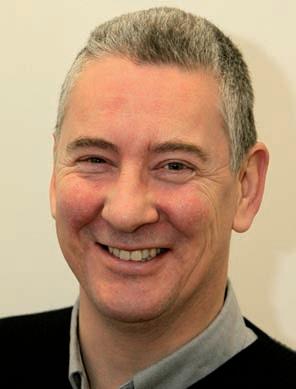
Technology - Just because we can, doesn’t mean we should
I was fortunate enough to see the introduction of computers into mainstream use in the 1980’s. Back then, they were not much more than word processors and portals for email, but nonetheless a real boon compared to a typewriter. Ever since, year on year, computing power and technology has seemingly advanced at an expediential rate. Indeed, take a quick look around the room now and you will see many examples of technological advancements in everyday existence that were mere pipe dreams a few years ago.

Gizmos, gadgets and computers are now so much part of our daily lives, the younger generation find it difficult to imagine what it must have been like to grow up without them. My children often laugh at how we did things thirty years ago and wonder too, just how we coped back then without the enormous array of electronic gadgetry now at our disposal.
My usual riposte is to say that “we coped and managed just fine”. Admittedly, some things were slower and less instant, but we were also less stressed and more patient and sociable.
To illustrate what I meant, I got hold of a copy of the film ‘Electric Dreams’. The movie, starring Lenny Von-Dohlen as ‘Miles’ and Virginia Madsen as ‘Madeline’, is a daft rom-com about how a computer develops a mind of its own and decides to cause untold strife for Miles and his relationship with Madeline. The computer develops the ability to link up with other computers, shops, cinemas, credit card companies, ATM’s, CCTV systems, the phone networks and Miles’s household appliances. The computer literally ends up controlling his life. At first, it’s all novel and fun, but then the computer decides to mischievously cause these everyday things to malfunction and literally cause untold mayhem for our leading character. The film ends with the destruction of the computer and life becoming much

better for all. Made in 1985 the story was a fantasy and the technological ability of computers in the film weren’t possible back then and we had no internet until around 1990. However, what is striking about watching an old film like ‘Electric Dreams’, apart from being an enjoyable and lighthearted love story, is the fictional computing powers and cyber terrors portrayed are a reality today.
So, it begs the question, with so much of modern life reliant upon computers and electronic gadgetry are things really better or just different? I’ve written before about

the threat of technology to jobs, but this time I’d like to debate the impact technology is having upon society and, in particular, social interaction and mental wellbeing.
Humans are, by nature, social creatures. It was Aristotle who said “…Man is by nature a social animal...Society is something that precedes the individual. Anyone who either cannot lead the common life or is so self-sufficient as not to need to, and therefore does not partake of society, is either a beast or a god…”
Today we are encouraged to do almost everything online, be it working, banking, shopping, communicating, research or leisure. The flipside or ‘butterfly effect’ is a society that is fast withdrawing into itself with people who no longer speak to each other and communities that no longer look out for each other. We are told the

technological advancements of today exist to make life easier for everyone, yet we have never been more stressed and overworked than before, largely in part to the fact that much of the technology we are compelled into adopting is not that secure or stable and often prone to viruses and cyberhacking. Indeed, be it the NHS, the MOD or British Airways, there is almost daily news of one organisation or industry being crippled by computer glitches and technological failure.
Increases in mental health disorders, sleep deprivation and obesity are all being attributed to a society being compelled, even addicted, to technology. Life is for living, not existing, so if the principal benefit of the technology, robot or app doesn’t improve our life or wellbeing, why bother? Perhaps, when a new technological solution is being developed or promoted, we ought to pause and ask who the real beneficiary is. Will it be easier for the supplier or user? What happens if it fails and what are the alternatives and security implications? Balance what will be gained, against what could be lost. In other words, ‘just because we can, doesn’t mean we should.’ We will continue to evolve and advance and there are many great examples of technological advances, such as in healthcare and transportation. However, technological advancement is not always necessarily progress. In many cases, technology is simply doing things differently, but not necessarily better. Maybe sometimes the old way is still the best way.
Mobility and homecare products supplier H&M Health & Mobility has been presented with an international award in recognition of its dedication to environmental best practice.
The Green Apple Awards are selected and bestowed by the Green Organisation, an independent, non-profit environmental international group dedicated to recognising, rewarding and promoting environmental best practice around the world.
When assessing applications for a Green Apple Award the judges assess a number of things such as: Does the entry clearly identify a clear environmental benefit? Are there some innovations that demonstrate new or novel solutions to existing problems? Is there a social and economic benefit to communities?
Over the years there have been quite a few winners of the Green Apple Awards from the homecare industry. Businesses such as Platinum Stairlifts, which won a Green Apple Gold Award in the category of Waste Management and Manufacturing. The company was recognised for its green manufacturing process and also singled out for its dedication to sourcing many materials from local suppliers, and its commitment to basing its manufacturing operations in the UK rather than overseas.
H&M Health & Mobility based in Consett, Country Durham won the 2024 Gold award in the Sustainable Development Category. Directors Hugh and Yvonne Malone were presented with their award at a presentation at Kensington Palace in November. The award was presented by Helen Kitchen, Business Development Manager of Yealands Wines of New Zealand.
Competition for a Green Apple Gold is extremely high and 2024 was no exception, with well-known supermarket chains, industrial giants and multi-millionpound utilities all among the contenders. The presiding judge described the accomplishment as “very well deserved” when announcing H&M Health and Mobility had achieved the Gold.
The award recognises the company’s pioneering efforts to make homecare provision greener.
H&M Health & Mobility is a major supplier of bath lifts and other mobility and homecare products. In the NHS, patient care is categorised into two main levels: primary and secondary. Primary care aims to address common health concerns, offer preventative care, and manage chronic conditions. This is crucial to helping disabled, critically ill and terminal people live more comfortably at home or in community care facilities. There are a wide range of products available to address

the varying needs of primary care. However, one of the most crucial are products that help disabled, elderly and infirm people to keep clean and hygienic. The bath lift is one of the most popular due to its ease of use to help people to get into and out of a bath safely.
Hugh and Yvonne Malone have been in the homecare industry for many years and are very familiar with the main issues of bath lift provision that impacts environmental issues. So they decided to provide and create a product, supply, delivery and support process that addresses these issues and thus reduce the bath lift carbon footprint
H&M Health & Mobility identified a number of areas they felt could be addressed and improved. In particular, that bath lifts were traditionally single use with little to no recycling and wasteful warranty issues and spares.
The first step was to look at and set criteria on how they could provide sustainable products and services. With that aim in mind the company brought the Kanjo Bath Lift to market.
The Kanjo Bath Lift has been designed so that it is very easy to be cleaned and reused and recycled via Council Community Equipment Stores. This offers a massive benefit by making access to bath lifts much quicker for those in need and saves money too.








Golf is a game we can all enjoy. At our own pace we can make friends, free our minds and enjoy the beautiful outdoors. In recent years, golf has opened its doors to all including, crucially, people of all abilities.

Golf is naturally one of the most inclusive sports to play due to its stationary golf ball, its fair handicap system, a focus on the individual and its calm rhythm. For the one in six people globally who live with a disability, golf offers not just exercise, but connection, a welcome, competition, and the joy of being part of a larger community.
Golf’s health-enhancing benefits include: increased longevity, improved cardiovascular, respiratory, and metabolic profiles, improved muscle strength and balance, and enhanced mental wellbeing – improving confidence, self-esteem and anxiety levels (as stated in the World Golf Foundation’s ‘Golf & Health Study’, 2020).
For a person with disability or impairments there are huge additional benefits which are rooted in social interaction and support. When you play golf, you don’t just exercise, you can also spend hours in the company of friends and individuals who share a common experience.
Some 4,000 golfers are registered to play in

international G4D (golf for the disabled) tournaments but, importantly, the game is just as relevant for the many more golfers who play recreationally, or even play a version in a nongolfing environment, such as a hospital, a rehabilitation centre or school.
While most people play for the absorbing enjoyment that golf offers, there is a complete ‘player pathway’ which also allows them to secure new opportunities as they compete and play. In golf, many people can elect to start by chipping and putting at a golf club or centre and maybe having a lesson. You can take it further, as a regular golfer, playing or practicing alone or with friends, or moving into competitive golf at both a national and international level.
Like other sports, the game has grown to include high profile tours such as the G4D Tour, run by the European Tour Group (ETG), international championships run by the European Golf Association (EGA) where you can represent your country, and major championships such as The G4D Open, run by The R&A partnered by the ETG, and the USGA’s U.S. Adaptive Open.

Martine Gilks, a golfer at Coventry Golf Club, loves the game. She has osteoarthritis and fibromyalgia, with effects of chronic, widespread pain and fatigue. Sometimes she must force herself to play but says: “Golf is about friendships and social interaction. I can access golf without a carer, giving me freedom and independence. At the club my disabilities don’t define me and I’m the same as my friends.”
Welshman Mike Jones faced the trauma of having his lower left leg amputated following a motorcycle accident. Mike’s advice: “You don't have to be a superstar, all you have to do is hit a golf ball and putt a golf ball. I am always telling people you can do it, you can do it, you can do it. Come and play golf with us and enjoy all the health benefits.”
Michelle Lau from Cambridge, has autism and ADHD. She calls the game ‘Nature Chess’ and is keen to support more neurodiverse people to try golf. Michelle says: “I love the game. With golf, it’s one shot at a time. I’m learning that life is similar –take one step at a time and at my own pace.”
England’s Phil Meadows became a World Ranked seated golfer in 2023. Phil believes passionately in the value of golf for exercise and wellbeing. “I would tell somebody to give it a go, it’s fantastic. It’s always about challenging yourself and trying to push yourself to see where you can get to, and where you can drive the golf ball next. I just love the game, love getting out there, love meeting new people.”
While the players above have achieved individual success, underpinning these four stories and many more is that golf was able to welcome them well, and they are now expressing themselves through golf and inspiring others to join in.
If you wish to compete in tournaments, prospective players can find the information needed to obtain the requisite pass (see end). Internationally, EDGA runs, badges or supports 120 golf tournaments per year for men and women (mixed), and for all individuals with a disability (physical, intellectual, neurological or sensorial), and
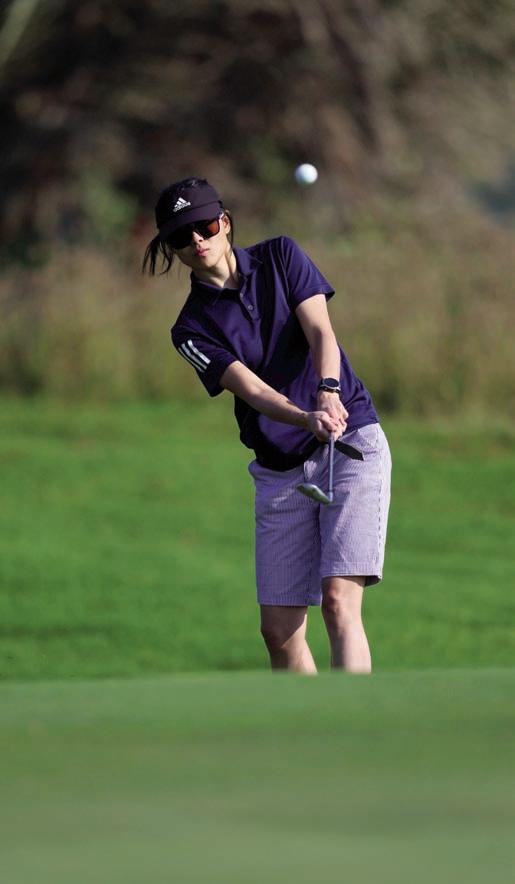
in GB&I there are tournaments in England, Scotland, Ireland and Wales this summer, as EDGA works closely with each of these national federations.
Inclusion, though, isn’t about everyone playing the same way. It’s about choice. The competitive golfer with cerebral palsy chasing a trophy, and the weekend player with one arm sharing laughs on the back nine: both have a place – and neither diminishes the other.
Golf can make you feel good to be alive. Everyone should be welcomed to play and, along with the pars and birdies, golf can provide the platform to make lasting friendships, and limit isolation. It’s therefore a great time to think about joining in!
For more on player passes, EDGA tournaments in the UK, contacting your national federation, and a wealth of stories on players with a disability, go to www.edgagolf.com Entry is free to watch The G4D Open in May.
See https://www.randa.org/championships/the-g4d-open
Watford based neurodiverse artist, Vijay Panchal, specialises in character design, visualising dreams and emotions. In 2010, Vijay attained his BA (Hons) in 2D Digital Animation focusing on communicating emotions through anthropomorphic characters. Vijay’s work has continued to organically grow. He has combined expressionism and figurative art to create a series of compositions on different media such as prints and t-shirts. His struggles with expression have inspired him in his goal to help others express themselves.
Due to battles with chronic ailments, Vijay is currently working on voluntary and charitable commissions and workshops, of which he has accumulated 13 years of experience serving over one thousand participants. From 2021 he has exhibited locally in Hertfordshire and at the Brick Lane Gallery. In 2022 he was a Finalist on the 7th Abstract International Juried Art Competition and longlisted for the Visual Artists Open. In 2023 Vijay completed the Hatch New Founders Launchpad Programme to develop facilitating his art wellbeing workshops. He has held them at Parallel Windsor, the Disability Awareness Festival, A2ndvoice, AIM, The London Interdisciplinary School and London Autism Group Charity.
From his business research he has developed a keen interest in Data Analytics and has remotely studied with Data Camp. He has also completed an internship with

Tectonic as a Data Analyst determining a UK market for a US health product. Vijay is currently studying AI and Machine Learning.
Vijay has recently engaged in public speaking advocating for Neurodiversity, Intersectionality, Hidden Disabilities, Suicide Prevention and CPTSD through his lived experience. In 2024 he has spoken on Charlie Hart'sClub AUsome Live Episode 3 - Mental Health Awareness Week Neurodivergence and CPTSD, Louder on Set by Anna Wallace at Parallel Windsor, Uncommon Journeys, Savia Rocks - Us People Podcast, Impact 73 and with the Speakers Collective for Neurodiversity Celebration Week.
For more information visit www.vijaypanchal.weebly.com Instagram: @vijaypanchalfineartist
Making clients who struggle with stable posture is being improved with a new support system from AAT GB.
Once a disabled person is taller than 150cm, making sure they are sat correctly and safely, especially when travelling or participating in any seated activity, becomes a problem.
The development of the Voyageur belt system means that problem is solved, quickly and unobtrusively.
The inventors themselves have a disabled child. It was their own personal experience that inspired the development of Voyageur, when their child grew too tall for a conventional car seat.
The resulting system is simple. It comprises just two elements- the Seat Grid tether system and X-Posture Suit of positioning safety belts. Each element is secured simply by magnetic bukles, so it is quick to attach, fit, and release- even with one hand. No tools are required.
Although designed primarily for car usage, the universal-sized Seat Grid can be attached to any seat where the straps can be passed between base cushion and back.
X-Posture Suit’s belt configuration with shoulder and hip straps means the torso is secure, stable laterally and vertically and correctly positioned with abduction to the thighs and stability to the pelvis. It is available in two sizes depending on the user’s waist and thigh dimensions.
“Voyageur extends the horizons for so many people who need postural support,” says Peter Wingrave, AAT Director. “So long as there is a suitable seat for Voyageur, it can provide the stable and comfortable support needed to safely enjoy sedentary activity- not just going out in the car, but sailing, cycling, flying to name a few!”

Voyageur sits alongside AAT’s Stabilo range of innovative postural support cushions, including the infinitely adjustable Chilli Bean vacuum posture seat.

Travelling with your scooter or powered wheelchair should always feel enjoyable, whether you’re off on a big adventure or just popping to the shops
Thinking about your next trip? Now’s a great time to start planning for new adventures. A little preparation can make your journey smoother and stress-free.
Here are some simple and practical tips to help you travel with confidence:
If you’re travelling somewhere new or using a different scooter or wheelchair, take a little time to get familiar with it.
Understanding the controls and how your vehicle handles will help you feel more confident and safe on your journey. You can always check your manual or speak to your dealer if you’re unsure.
Practising in a familiar area before venturing further can make all the difference.
A quick look at the weather forecast before you leave can help you prepare.
If it’s sunny, wear a hat and sunglasses to reduce glare, and apply sun cream to protect your skin.
It’s also important to look after your product in warm climes, especially during a heatwave. Follow our tips below for battery and tyre care to keep your vehicle safe during hot weather.
Batteries can overheat, especially in high temperatures, so follow these tips to keep your battery cool:
• Keep it cool: Store your wheelchair or scooter in the shade and avoid leaving it in a hot car
• Charge safely: Charge in a cool place and unplug once it’s full
• Check for damage: If the battery feels unusually hot or looks swollen, stop using it and get it checked
Hot weather can change tyre pressure, which might make your wheelchair or scooter harder to control. These tips will help stay safe while travelling:
• Check tyre pressure: Heat makes air expand, so check your tyres often to make sure they’re not overinflated
• Look for damage: High temperatures can cause cracks or wear. If you spot any damage, replace the tyre
• Avoid hot surfaces: Pavements and roads get very hot in the sun, which can affect tyre pressure. Try to stay in the shade where possible
By keeping an eye on your battery and tyres, you can travel safely and enjoy your journey, even in the heat.
Rain is always a possibility if you’re travelling in the UK. Scooters and powered wheelchairs are electronic, so too much water can cause damage. If you get caught in an unexpected shower, try to find shelter until it passes.
After it’s rained, you could use a dry cloth to remove any water, dirt and debris from your product.
You should always follow the manufacturers charging process and stipulations and these can be found in the User manual.
Knowing where you’re going in advance can help you avoid any unexpected obstacles.
Check if there are narrow pathways, steep slopes, or other potential barriers. Look out for accessible routes with drop kerbs and ramps.
You should also check the laws of the country you’re travelling to if you’re going abroad with your powered wheelchair or scooter.
We encourage you to check your user manual before travelling as most manufacturers state that extra care should be taken when around water ways, docks and harbours. The maximum gradient that each product is tested to will also be stated in the manual.

A clean wheelchair helps keep you comfortable and makes sure your equipment lasts longer, especially before you travel. Here’s how to keep your product in great shape:
Switch off your wheelchair and, if you can, disconnect the battery. This helps prevent any electrical issues while cleaning.
Use a damp cloth with mild soap to clean the frame, seat, armrests and footrests.
Keep water away from electrical parts to avoid damage.
Clean the wheels
Remove dirt and debris using a brush.
Dry it properly
Use a soft towel to dry everything fully. This helps stop moisture from causing damage.
Disinfect regularly
If you’ve been in public places, wipe down areas you touch often with a safe disinfectant.
Did you know a flat battery is the most common reason for breakdowns? Before you head out, check you have enough charge for a return journey.
Most mobility scooter batteries last between one and two years with regular use. Very hot, cold, or damp weather can affect how long your battery lasts. For example, being in high heat often can make it wear out faster.

If you’re using a new mobility aid, taking care of your battery from day one will help it last longer and keep your wheelchair or scooter running smoothly.
Following these simple steps will help keep your battery in great condition for longer.
Charge it fully before first use
When you get a new battery, charge it fully before using your wheelchair or scooter. This helps it work at its best from the start.
Recharge regularly
Try not to let your battery run completely flat. This can wear it out faster. It’s best to charge it after each use, no matter how far you’ve travelled.
Use the right charger
Always use the charger that came with your mobility device or one recommended by the manufacturer. The wrong charger could damage the battery or make it less effective.
Plan ahead
Charging your scooter overnight helps keep the battery in good condition. If you’re going on a longer trip, you might want to take your charger with you.
It’s also worth checking your scooter or wheelchair’s general health before you set off, especially if you’re travelling further than usual. Avoid unnecessary extra weight
Hilly routes or carrying extra weight, like shopping bags, can use more power. If your journey includes steep slopes or extra luggage, plan for shorter distances.

Staying hydrated is important, especially on warm days.
Dehydration can cause headaches and affect your energy levels. Keeping a bottle of water with you can help you stay refreshed.
No one expects to break down, but if it happens, we’ll do our best to get you moving again as quickly as possible.
However, if you’re in a rural area, it may take longer for Motability Assist to reach you.
It’s always a good idea to bring any essential medication or equipment with you, just in case you need to wait a little while.
With a little planning, you can relax and enjoy the journey, knowing you’re prepared for whatever comes your way.

With a little planning, you can travel with confidence and enjoy the journey. Why not take a moment to check your scooter or wheelchair now, so you’re ready for whatever comes next?


This is the question often asked to wheelchair users at an airport check in, along with can you walk? Why can’t you walk? I think the wrong question is being asked. Is the airline industry fit to fly our community? It clearly is not. There is hope on the horizon, a v i a
o r d e r, alas it is moving at a glacial pace. Over in the US the news is not good. The airline lobby group have hit the US Department of Transport with a lawsuit declaring the legislation put in place under Biden in 2024 to protect wheelchair users is a regulatory “overreach” I guess given the Trump administration rhetoric on DEI this is not surprising.

When we look at data, we must remember that the U S p o p u l a t i
e a i r t r a
a r m o r e than most other countries. Firstly, it is of course a big country, so air travel is frequent and fast Secondly, there is little transport over land and train travel is sparse unless you are in a major city Europe has good transport infrastructure and networks. This does not mean it is perfect, but we do have it.

The R i g h t s o n F l i g h t s campaign group is starting to impose its lobbying might on another anomaly in accessible air travel, the safety assistant This additional role is taken on by the carer/PA when a disabled passenger needs additional support in the aircraft cabin, yet it is the disabled traveller that must foot the bill for their ticket. Thus, the cost of this extra ticket is laid firmly at the foot of the disabled traveller. This is clearly an additional levy applied by the airline – tax by stealth if ever there was one. Watch this space!
Rights on Flights member S o p h i e M o r g a n took to the stage in London for her TEDx talk, in a hard hitting 15 minutes she covered the basic inequalities that we all know about
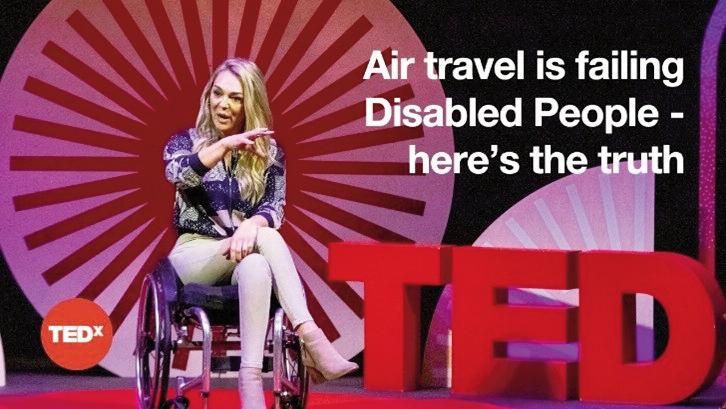

April is cherry blossom season in Japan. Across the country, the Sakura trees bloom profusely, giving rise to spectacular floral displays of pink and white. But while this is undoubtedly a stunning time to visit, this incredible country has so much to offer at all times of the year.
We visited in October and fell completely in love. From the warmth and courtesy of everyone we met, to the fascinating culture and the superb accessibility, it was a wonderful trip.
Our adventure started in Osaka – known as Japan’s foodie capital, it certainly did not disappoint. A trip to the famous Kurumon market was an experience. Housed in Osaka’s largest indoor market hall, it plays host to around 150 shops with a wide array of goods on offer. For the seafood lover, there was a huge choice - spiky sea urchins, octopus eggs and some of the largest crab legs I had ever seen. Street vendors were cooking up treats at every corner – Wagyu beef kebabs which cost pence but tasted like heaven, as well as many less easily recognised delicacies.
The atmosphere in Osaka was vibrant and energetic, as demonstrated by the huge street parties at Halloween. Women are generally quite modest in their dress. But this was all put aside for one night with a wild array of costumes on display, as everyone gathered to celebrate in the streets. The atmosphere at the waterside area of Dontonburi was fabulous, crazy but so much fun, with everyone out to enjoy themselves.
Osaka is a large sprawling modern metropolis and nowhere is this more evident than from the top of the Haruka Tower, the city’s tallest building. Standing at 300m tall, it offers a panoramic view of the whole city from floor to ceiling windows and is truly an impressive sight, especially when viewed at night.
Another site to visit at night is the spectacular Osaka Castle. Originally built in 1583, it is one of Japan’s most famous landmarks. The castle was periodically renovated between 1931 and 1937 to ensure that it still retained its splendour, especially when illuminated at night.
A short (and easily accessible) train ride away brought us to Nara, which could not have been more different. Visitors flock here to see the famous deer, who will eat from your hand and have learned to bow for treats. Nara
is also home to one of the world’s largest bronze Buddha, housed in the Great Buddha Hall, the largest wooden structure in the world. But despite the many tourists, the city felt much more peaceful and it was great to just wander, enjoying the traditional architecture. As in Osaka, it was easy to get around – pavements were flat and smooth, buses had lowered ramps and the main attraction had designated routes for wheelchair users, fully ramped to enable easy access.
From Nara, another short train trip brought us to the old capital of Kyoto. This was not as I had expected – in my head I had been imagining a city that felt like the Japan one imagines from many years ago. What we found was another modern city, seen immediately by the incredible railway station that greets visitors on arrival. But we had been told to look in the spaces and that is exactly what we did. And in those spaces we found the Japan that we had imagined. We saw a geisha going about her business on the tiny street of Pontocho. We savoured the spectacular night-time illuminations at the


Kodai-ji temple. In Higashiyama on the eastern side of the city, this stunning temple is a testament to love, built by a widow to honour her beloved husband. The gardens were exquisite - visitors could see striking vistas and wander through the bamboo groves, illuminated by fairy lights snaking up into the heights. Most of the site was accessible with level paths, although the bamboo grove was accessed by steps.
A night-time visit to the old area of Gion was magical. The city’s most famous geisha district, old teahouses and restaurants inhabit the traditional wooden buildings where geisha still entertain their clients.
But Kyoto was not only beautiful at night! Kinkaku-ji, also known as the Golden Pavilion, is a World Heritage Site and one of the city’s most famous attractions. A Zen temple housed in beautiful grounds, it sits next to a large pond in which the temple is reflected, creating a glorious image. This is highlighted even more when the sun catches it, as the top two floors of the temple are covered entirely in gold leaf.
My personal favourite however was Sanjusangen-do, the Temple of 1001 statues. Pictures are strictly forbidden, which made visiting this Buddhist temple even more intriguing. On entry, visitors go through a few halls before entering the main one, in which 1000 statues line up like a silent army around a large central statue of the goddess Kannon, the goddess of compassion. Every single statue is subtly different, and it is said that if you look closely, you will see your own face reflected back at you in one of the many figures. It was incredible, albeit slightly eerie, with hundreds of these statues ranged in lines, like they were patiently waiting for something,
maybe to come alive… This was further enhanced by the monks chanting to them as we left at closing time.
Japan was an experience, unlike anywhere else I have ever visited. An intriguing fusion of new and old, vibrant and energetic, yet with a definite underpinning of the traditional. Neon lights and colourful signs advertised every kind of entertainment and shopping experience, while mingling with the crowds on the streets would be young women dressed in traditional kimono. Everywhere we went, we experienced the most phenomenal hospitality – whether that was the young woman, who spoke no English but gave up fifteen minutes of her time to help us navigate a busy train station, or the woman who stopped us on the street to give us an umbrella when it was raining. It is considered rude to eat or drink when walking along the streets or on public transport, but this is reflective of the innate consideration that people here show to those around them. This even extends to signs, reminding people to keep their belongings close to hand in public places. Not, as in Europe, because of theft, with the crime rate being very low here, just to ensure that you are not causing difficulty to anyone else.
From an accessibility point of view this was hugely helpful. We were very impressed by how easy it was to travel by public transport – all the train stations were accessible with plenty of lifts, and at least at the bigger stations, clear signage in English too.
Pavements were generally wide and smooth, in good repair, making getting around straightforward. While there were of course some restrictions to access, due to the architecture of old buildings, we were continually surprised by how much thought had gone into to making as much as possible accessible. And where there were shortcomings, even if they were few, people were always eager to help. I can’t wait to return.

Cheryl Everitt is the founder of A Wheel and Away, an accessible travel consultancy designed to help people with disabilities plan exciting and independent adventures. She is also mum to two young people who are wheelchair users and, as a family, they share a love of exploring new destinations. For more information about A Wheel and Away go to www.awheelandaway.com

An artist with Down's syndrome, one of whose paintings is owned by the Princess of Wales, is aiming to have some of her work selected for the London Art Biennale at Chelsea Old Town Hall this summer.
Fiona Stevenson, whose painting, Wave, was accepted as a gift by the Princess of Wales, is submitting three of her latest paintings to the London Art Biennale, which takes place from July 16 to 20 in the iconic King's Road. The work of artists from more than 50 countries has been exhibited over the years at the Biennale, many of whom have seen their art displayed at some of the most important museums in the world.
The exhibition, co-curated by Chelsea's Gagliardi Gallery, has previously donated original work by Andy Warhol, Pietro Annigoni and the son of Salvador Dali, Jose Van Roy Dali, to charities such as Age UK, the Salvation Army and London Air Ambulance as part of its mission to support people in need.
Fiona, with her royal patronage, is in good company with the Gagliardi, which also numbers members of the royal family among its clientele. Its owners have been photographed with the likes of Princess Margaret, the Princess Royal and Lord and Lady Frederick Windsor.
As well as enabling artists to showcase their work and widen their contacts in the art world, the Biennale is offering cash prizes totalling £13,000 to some of its featured artists.
Fiona will not be the first artist with Down's Syndrome to have connections with the Gagliardi Gallery, which already represents self-styled ‘badass non-verbal' Bulgarian-born Texan artist Sevy Marie.
See some of Fiona Stevenson's work, and view her virtual galleries at www.fionastevenson.co.uk
One of the biggest problems as we get older is growing lack of mobility and balance. Even something like going up and down stairs and steps can become difficult. That puts a person at greater risk of falling. It limits their confidence to go out and about, to do the normal things in life that they enjoy.
Convention dictates that where stairs are concerned, the solution is a stairlift. There is an alternative. An alternative that does not require installation, alteration to the physical structure of the home. That does not occupy space nor restrict the other family members’ use of the internal space. That is portable, so can be used wherever varying levels would restrict. That can be in place and in use within days.
The answer is an S-Max stairclimber. The batterypowered kinematic unit is Class 1 Medical Device certified. It means any member of the family or a carer can, with appropriate

training (included in the purchase price), safely and smoothly help the limited person get up and down any steps and stairs - in the home, or away. S-Max can easily move up and down stairs and beyond into wherever needed - the bathroom, bedroom, lounge, kitchen, the garden. There is no need to transfer.
The S-Max can be fitted to most standard wheelchairs, so there is no need to risk transferring from wheelchair to another piece of equipment to get up and down stairs, with the associated potential to fall in the process.
There is also an integrated seat version- the S-Max Sella.
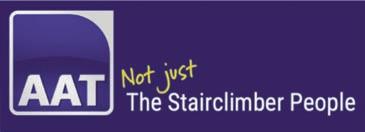
The S-Max is available in the UK exclusively through AAT GB, which offers free, no obligation assessment- of the person who needs help, their carer(s) and their environment. AAT will also train anyone who will be using the stairclimber to ensure optimal safety at all times and provide annual servicing if required.
The Marsham Court Hotel is proud to announce that it was recently awarded two gold awards at the annual Dorset Tourism Awards. The hotel, well known for its exceptional service and facilities, took home accolades in two key categories: Accessible and Inclusive Tourism and Business Events Venue of the Year.
The Dorset Tourism Awards, a highly regarded event celebrating the best in tourism across the County, was this year hosted by Marsham Court Hotel itself, welcoming over 200 guests from various sectors of the local tourism and hospitality industry. The event highlighted the achievements of businesses and organisations across Dorset, and the Marsham Court Hotel’s commitment to Accessibility and Inclusivity was acknowledged with the coveted gold award.
“We are over the moon to receive these two gold awards,” said Managing Director and Owner of the Marsham Court, Rosie Radwell. “Our team has worked tirelessly to create an inclusive, accessible space for all guests, and to offer a top-tier venue for business events. These awards are a testament to their hard work and dedication, and we are thrilled to share this recognition with our community.”
The Accessible and Inclusive Tourism award celebrates the hotel's efforts to provide a welcoming and accommodating environment with access for all guests. The Business Events Venue award highlights the hotel’s versatile event spaces which are used extensively to host a variety of conferences, meetings, and corporate gatherings.
Located in the heart of Bournemouth, the Marsham Court Hotel offers an ideal setting for both leisure and business stays. With modern facilities, stunning views, and a dedicated team committed to exceptional service, the hotel is quickly becoming a go-to venue for businesses seeking a welcoming, accessible, and professional environment for their events.
As a winner of these esteemed awards, the Marsham Court Hotel is now positioned as a top choice for businesses looking to host memorable events with a focus on inclusivity, accessibility, and seamless service.
For more information about the Marsham Court Hotel’s business event offerings or to book an event, please visit www.marshamcourthotel.co.uk or contact Ashlie Hayes, Events Manager on 01202 446644.



As synthetic speech continues to advance, its potential applications in accessibility are growing. For blind and partially sighted audiences, high-quality audio description (AD) plays a crucial role in making film and television more accessible
But can synthetic voices deliver an AD experience comparable to human narration? To explore this question, RNIB worked with several broadcasters, and the Acoustics Research Centre at the University of Salford to assess how synthetic AD performs across different content genres
The study combined qualitative and quantitative methods to capture audience perceptions Participants evaluated synthetic AD across six sample clips from entertainment, drama, sport, factual programming, and documentaries. The research revealed a nuanced picture: synthetic voices were considered acceptable for clarity and consistency, particularly in documentary and factual genres where the primary function is delivering information However, they struggled to match human narrators in conveying emotion, spontaneity, and contextual sensitivity key factors that enhance engagement in entertainment-focused content
A key concern raised by participants was the importance of matching AD tone to the content’s emotional and cultural context Technical factors, such as sound mixing and audio ducking (balancing AD against background audio), were also highlighted as areas requiring particular attention when synthetic speech is used The feedback suggests that synthetic AD, while promising, must meet minimum quality standards to ensure a positive viewing experience.
As a next step, RNIB is proposing a set of industry-wide benchmarks for synthetic AD, covering intelligibility, prosody, and emotional adaptability Further pilot projects will explore how synthetic voices can be optimised for different types of content, and whether manual or automated ducking strategies impact viewer experience While synthetic speech offers scalability, this study reinforces the continuing value of human narration, particularly for emotionally rich storytelling. With further research and development, synthetic voices could complement but not replace human AD, providing greater accessibility without compromising quality
For more information call the RNIB Helpline on 0303 123 9999 or visit www.rnib.org.uk

10-year-old Rosie Davidson from Kent has won RNIB's writing competition for children with vision impairments, judged by award-winning children’s author Tom Palmer
As a baby, Rosie had Retinoblastoma, a kind of cancer of the retina which required years of treatment and left her with limited vision in one eye She beat the condition and still has good vision in her other eye
Rosie’s story describes a dark and unwelcoming city that is slowly transformed into a beautiful paradise after she plants a seed and other children start doing the same On winning the competition, Rosie said she was “delighted”. She loves reading, especially fantasy stories and non-fiction, and spends a lot of time writing in her spare time
Tom Palmer whose book ‘The Soccer Diaries, Rocky Takes The Lead’ is one of this year ’s World Book Day £1/1 50 titles, said: “I was delighted to be invited to be the judge for RNIB’s World Book Day competition I used to work for RNIB reading stories to children with vision impairment, so it’s very special for me to know that there are great opportunities for kids with vision impairment to read and write The competition entries I read were all really imaginative
"Rosie’s idea of the seed-planting is a winner It is a story of hope and the idea that one person can do something good that trickles down to make the world a better place The story is told in clear short sentences and is laid out so that it feels like a poem That’s lovely too It’s a great story and my winner. It gave me hope.”
Sight Village is the UK’s leading exhibition and an integral part of the blind and low-vision landscape, attracting thousands of visitors each year. This exhibition provides a unique and welcoming space where people with visual impairments or low vision can explore the latest technology, products, and support services. It offers an opportunity to engage with new innovations in a sensory-rich environment, designed to meet the needs of the low-vision community.
Held in Central England, in Birmingham, the main Sight Village event is a two-day event that has become one of the most prominent exhibitions for people with visual impairments and low vision. It offers a space where visitors can experience life-changing assistive technologies, discover helpful resources, and interact with leading companies and organisations. Similarly, the London event will also be a two-day event in 2025, providing another significant opportunity for people in the capital to access vital information and support.
In addition to these flagship events, Sight Village also hosts roadshow events in various regions, including Cardiff, Glasgow, Blackpool, and more in 2025. These roadshows ensure that people from across the UK have access to essential resources and information, regardless of their location.
At Sight Village, attendees can engage with a wide array of exhibitors, including charities, commercial companies, and voluntary organisations from the UK, Europe, and beyond. This diversity allows visitors to learn about the latest advancements in assistive technology, gain insights into vital support services, and connect with experts dedicated to improving the lives of people with visual impairments or low vision.
Sight Village is more than just an exhibition — it’s a community-driven event that empowers individuals by providing knowledge, support, and networking opportunities. Whether you're seeking cutting-edge technologies, support, or simply looking to connect with like-minded individuals and organisations, Sight Village offers something for everyone. By bringing together a broad range of exhibitors and attendees, Sight Village continues to make a meaningful difference in the lives of people with visual impairments or low vision.

















































Warrington Disability Partnership, the organisers of the UK’s and possibly, the worlds, largest voluntary led pan disability exhibition are finalising the plans for their 34th annual event that will be the finale of a week of complementary mini events.
DAD 2025 will be held on Sunday 13th July at Walton Hall and Gardens in Warrington off the A56.









Event founder and co-ordinator Dave Thompson MBE DL said, “We are very pleased to announce that disability education specialists Expanse Learning Group and the North West’s water supplier United Utilities, are leading our list of sponsors for DAD 2025”.
The aim of this year’s event is to promote “It’s what disabled people can do that matters”. DAD 2025 exhibitors will highlight solutions supporting independent living and mobility, with equipment, products, transport, employment, education, training, health and social care, leisure activities, alongside over 100 charities/support groups.
Most of the exhibitors will be housed in a huge, tented village of marquees that will be supported by; a Sports Zone, a Main Arena, a Performing Arts Marquee, two further Arts Marquees for art and crafts, a Silent Disco and play areas. Entertainment will also be available adjacent to the entrance bridge and Heritage Yard.
On the day, visitors can gain an insight into the help and support that is available locally, regionally and nationally from statutory organisations, businesses and voluntary sector groups.






They can “have a go” at sports activities including Tennis, American Football, Snooker, Rugby League, Martial Arts, Tai Chi, and Scuba Diving in the onsite pool. In addition, Warrington Youth Zone’s giant sports inflatables.
For those looking for a more relaxed day we will have a fantastic line-up of talent in the Arts Marquee with some of the UK’s leading disabled artists including national favourites the Ella Performance Group. Alternatively, sit alongside the Main Arena watching the Guide Dog display team, Batida Rio Samba Band, Reach Sled Dogs Display Team, Royal Marines Corps of Drums and sports demonstrations. Children can visit Walton Gardens accessible onsite zoo, crazy golf, high ropes and pitch and putt.
Support services at DAD 2025 will include a free accessible Park and Ride service, free accessible buses from Warrington Town Centre, a free scooter and wheelchair loan service with trained enablers, British Sign Language interpreters, additional unisex wheelchair accessible toilets and over 100 trained stewards and helper’s eager to make it a day to remember for everyone.
Over the past few decades, Dave and his team have worked with organisations from across the world, who organise events in Cameroon, Gibraltar, Egypt, Sudan, Thailand, Uganda and many more countries.
For more details visit the DAD website www.disabilityawarenessday.org.uk or call Kate on 01925 240064



The Care & Occupational Therapy Show is back, bringing together the brightest minds in healthcare, innovation, and rehabilitation. Taking place on 16th July 2025 at Westpoint, Exeter, this premier event is a mustattend for care providers, Occupational Therapists, and healthcare professionals looking to stay ahead in the industry.
With over 200 exhibitors, the show offers a unique opportunity to explore the latest products, technologies, and services designed to enhance patient care and workplace efficiency. From cutting-edge mobility aids to assistive technology and care training solutions, visitors will gain valuable insights into the evolving landscape of the care sector.
Attendees will also benefit from a full schedule of CPDaccredited seminars, featuring industry experts discussing key topics such as dementia care, mental health support,
rehabilitation techniques, and regulatory updates. These sessions provide actionable knowledge and fresh perspectives to help improve standards of care across the board.
Networking is at the heart of the Care & Occupational Therapy Show. Professionals will have the chance to connect with like-minded individuals, forge new partnerships, and share best practices in a collaborative environment. Whether you're an Occupational Therapist, Care Home Manager, or allied healthcare professional, this event is designed to inspire and educate.
Don’t miss out on the South West’s leading event for care and occupational therapy professionals! Register today and be part of a movement shaping the future of healthcare.
For more information and to secure your free ticket, visit careexhibition.co.uk



Anne Herbert, a senior law lecturer at Bath Spa University, has Ehlers Danlos syndrome, which gives her skeletal instability. The slightest fall could be catastrophic. The 64-year-old – who has worked with the United Nations during her vast career both in the UK and her native US – explains: “I fall down and I have loose joints and a lot of spinal instability. My body is on alert all of the time.”
Anne was diagnosed 15 years ago and was told that she would have to spend the rest of her life using two walking sticks. “If I were to fall down and dislocate my knee, they couldn’t fix it and I would be in a wheelchair,” added Anne, who grew up in California and now lives in Bath.
It came as a shock for the dual US/UK citizen, who had unknowingly grown up with the genetic condition, but been labelled “a clumsy kid”, despite excelling at athletics due to being “stretchy and strong”. However, she had previously suffered multiple injuries, and had double ankle surgery, and ruptured a disc in her back when she was 16.
Anne, who always had a dog while growing up, had read about disability assistance dogs, and discovered Support Dogs. She looked into getting a puppy and spent a lot of time and effort in ensuring it had the right temperament and wouldn’t be a big dog that would pull her over. Cue Rafa, a beautiful Goldendoodle/Labradoodle cross, who soon became a life-changer.
Anne and Rafa, who is now four, enrolled on Support Dogs’ disability assistance programme in March 2023 – and they have now graduated as a successful partnership. “Now when I’m walking with
him, it’s as if my brain feels as though there’s an extra body part on the ground, and it’s re-opened up my sensory and motor pathways. I can hold onto Rafa and he stops me from falling.”
Rafa also helps Anne at home too, fetching her phone, the TV remote and taking her shoes and socks off for her. He is also well-known at the university where Anne works – “he’s a bit of a rock star on campus,” she said.
Anne, who is mum to 25-year-old twins Sarah and Maria – with whom she had to have five months bedrest while pregnant due to her EDS - added that Rafa’s presence also leaves her less worried about living alone and walking by herself. “If I were to fall and hit my head, that’s the scariest thing, but he has my identification and has been trained to get help. It’s like having a little assistant.”
Another way Rafa helps is that if Anne has been walking slowly, or tripped, people – “who aren’t particularly kind” or may think she’s drunk – now see Rafa and his coveted blue Support Dogs jacket and realise she is “part of a vulnerable population”. “People are much kinder and it eases my anxiety,” said Anne.
After negative experiences being diagnosed by separate health officials for individual conditions throughout her life before her final diagnosis, she was full of praise for Support Dogs. “It’s really been such a positive experience for my self-esteem and my mental health, as I can continue to be independent,” said Anne. I would really recommend people to sign up. Rafa helps me walk and helps me with tasks, but he’s also helped me grow as a person and reclaim some of my life.”

All these events occurred in the same year but in which year was it?
•Arthur C. Clarke’s 2001: A space Odyssey was published.
•The censorship powers of the Lord Chamberlain were abolished.
•The Rowan Point Tower block in London partly collapsed.
•Martin Luther King was assassinated.
“ …For every minute you are angry you lose sixty seconds of happiness…”
Ralph Waldo Emerson
The word may seem familiar but do you know what it means?
A – A wild silk
B – Poisonous plant
C – Chinese boat
•A Model, I was born Eleanor Nancy Gow in Sydney in 1963.
•I appeared in the film Sirens.
•I have a record five cover appearances for the Sports Illustrated Swimsuit issue. I’m nicknamed “The Body”. Who am I?
ACROSS
1. Winters (10)
7. SPECTRE (anag) – Otis Redding Song (7)
8. Dobbins’ straps (5)
10. Look (backward and forward) (4)
11. Least adorned (8)
13. Piece of pasta – military decoration (6)
15. Dining discs (6)
17. Unceremonious (8)
18. Corset bone – Shakespears Sister song (4)
21. Milky concoction – Otis Redding song (5)
22. Joy, e.g. (7)
23. Pear type, or the event for which it was named (10) DOWN
1. It makes waste, they say (5)
2. Birds’ counterparts (4)
3. Retina (anag) (6)
4. Without so much as a by-your-leave (8)
5. Incontrovertible (7)
6. Subjects of A Place in the Sun (10)
9. Imparting contentment (10)
12. DIY’s Y (8)
14. Wings, grass or mozzarella (7)
16. Rush – job (6)
19. Clan (5)
20. It may be interlibrary (4)
1. Which composer with the initials M.H. is one of only two people to have won an Oscar, a Grammy, an Emmy, a Tony and a Pulitzer Prize?
2. Which European capital located along the Rhine River has less than 6,000 residents?
3. Which World Chess Champion, a grandmaster at the age of 13, is known as the 'Mozart of Chess'?
4. Which English rock musician and former member of Humble Pie had the bestselling album of 1976 and played lead guitar on the hit song "Grease"?
5. Which 1994 movie is the highest grossing hand drawn animated feature film of all time?
6. What symbol is depicted on the national flag of North Macedonia?
7. Based on worshipper capacity, in which two cities are the largest mosques in the world located?
8. A magic charm or spell and a sauce. One word, four letters.
9. On 18 March 1965, Alexey Leonov became the first human to do what?
10. What is the most populated country in the world with French as the official language?
Tea Break is sponsored by

Getting you noticed Tel: 07968 421428
1. Hibernates; 7. Respect; 8. Reins; 10. Peep; 11. Simplest; 13. Ribbon; 15. Plates; 17. Informal; 18. Stay; 21. Shake; 22. Emotion; 23. Conference
DOWN
1. Haste; 2. Bees; 3. Retain; 4. Abruptly; 5. Evident; 6. Properties; 9. Satisfying; 12. Yourself; 14. Buffalo; 16. Career; 19. Tribe; 20. Loan
1. Marvin Hamlisch; 2. Vaduz; 3. Magnus Carlsen; 4. Peter Frampton; 5. The Lion King; 6. Sun; 7. Mecca and Medina; 8. Mojo; 9. Walk in space; 10. Democratic Republic of Congo
Remember When... 1968
Word play C – A Chinese boat
Who Am I? Elle Macpherson
To obtain the next four issues of Ability Needs Magazine, please tick box and attach a cheque for £10 made payable to Ability Needs at:






















